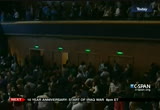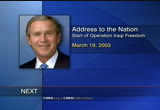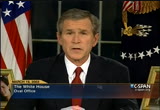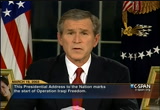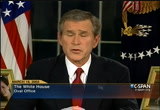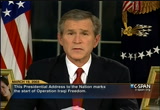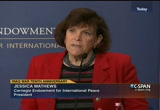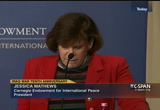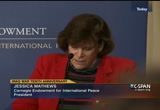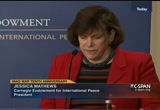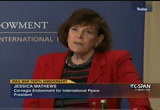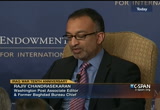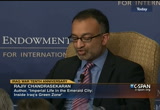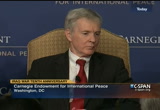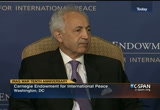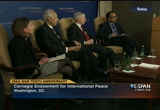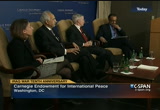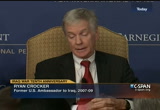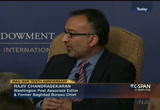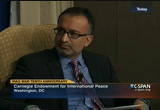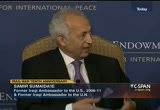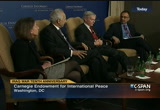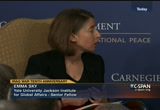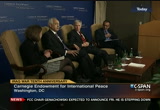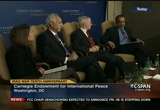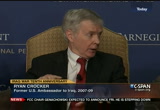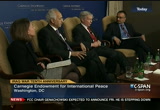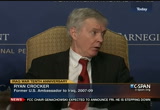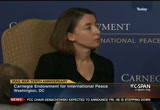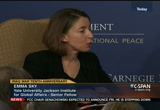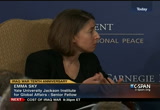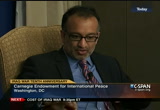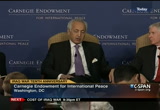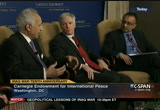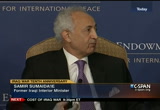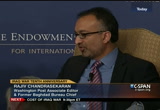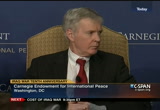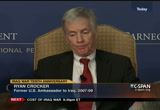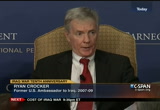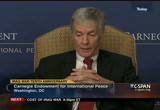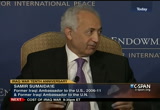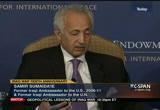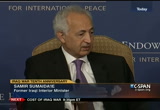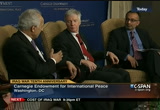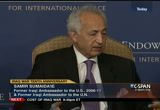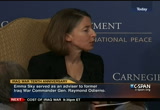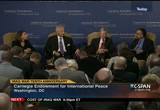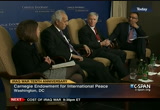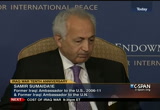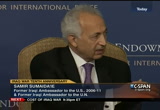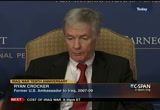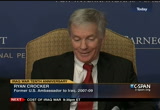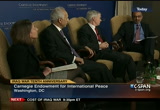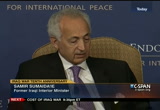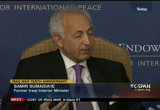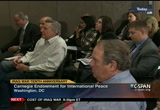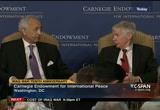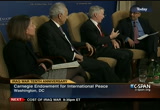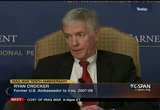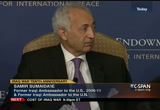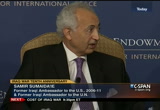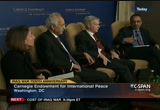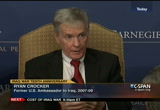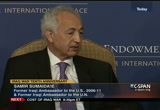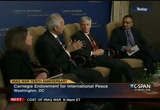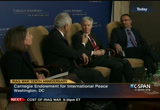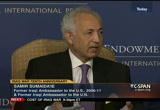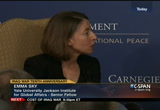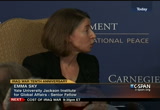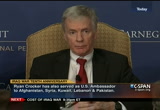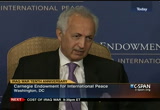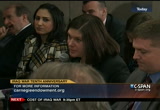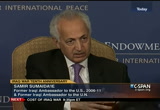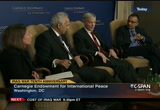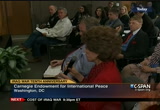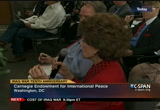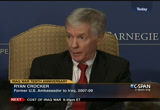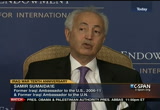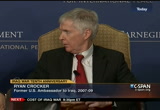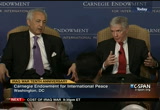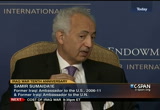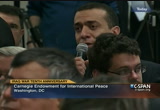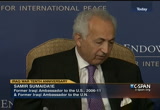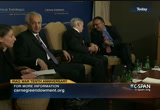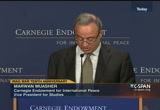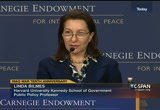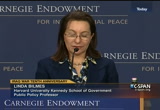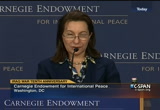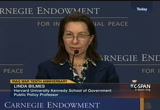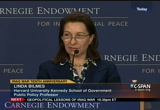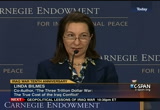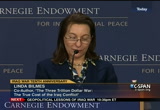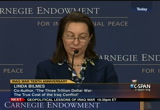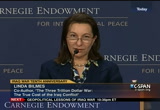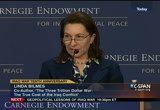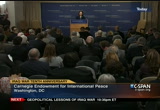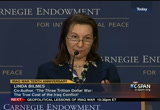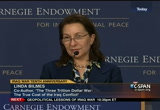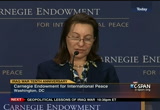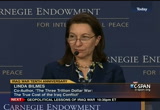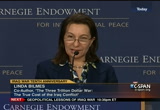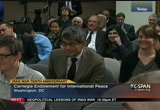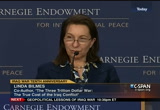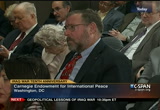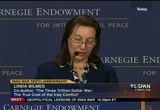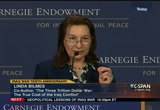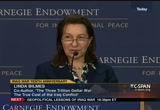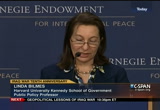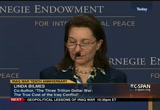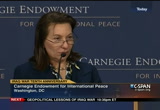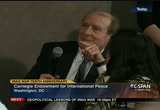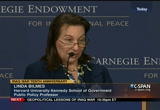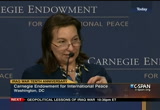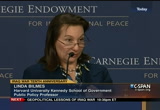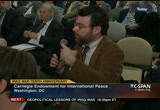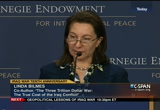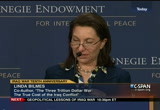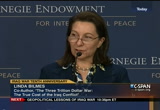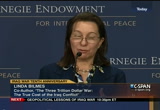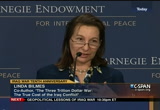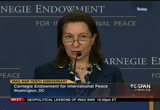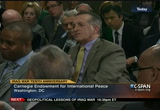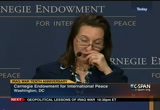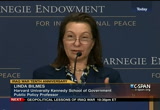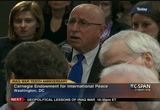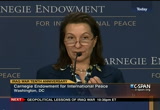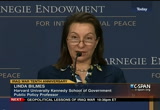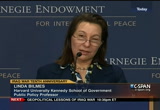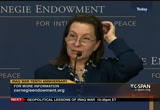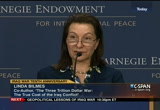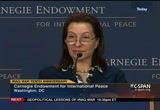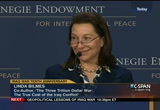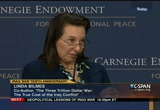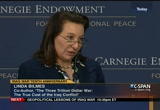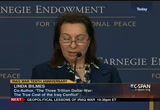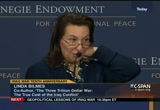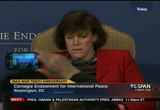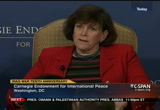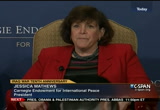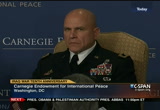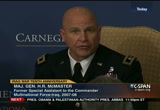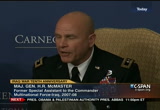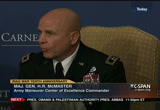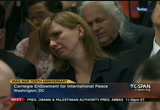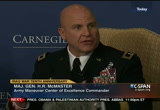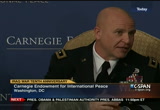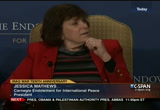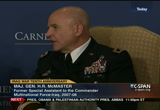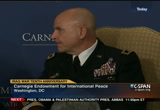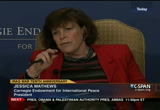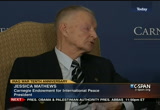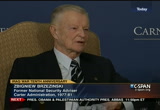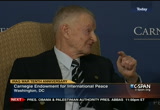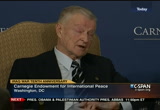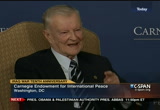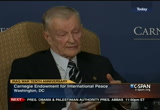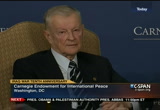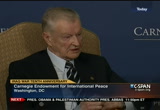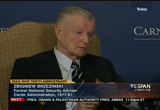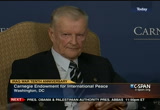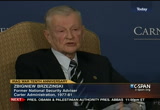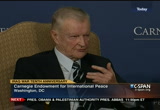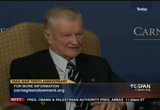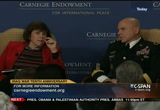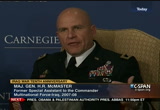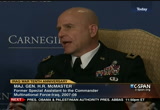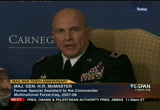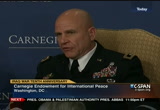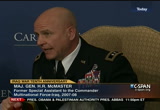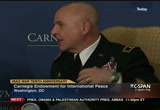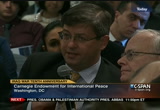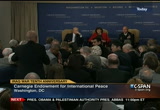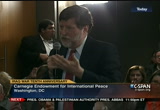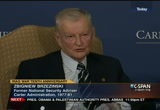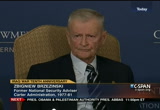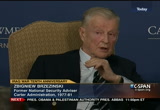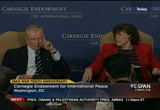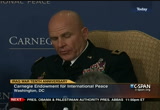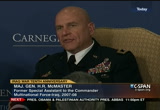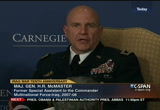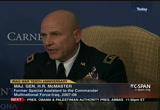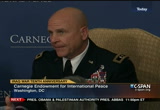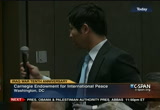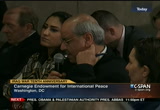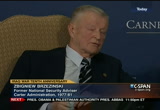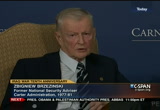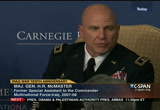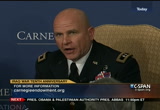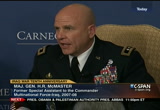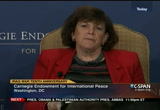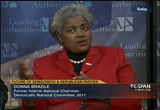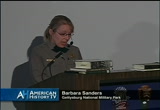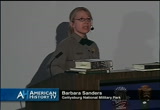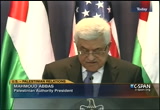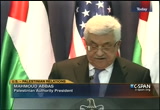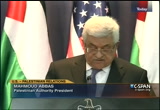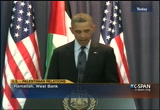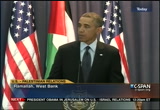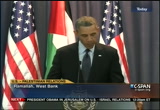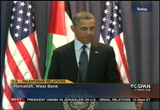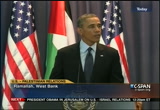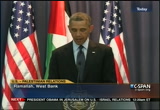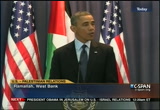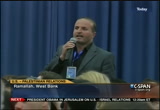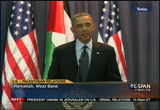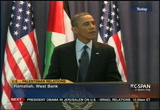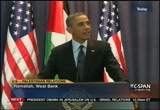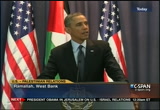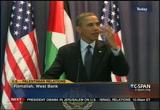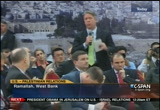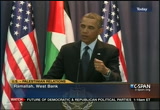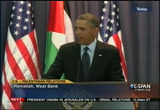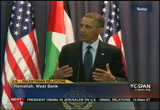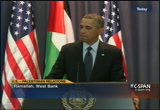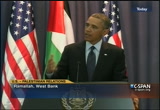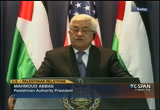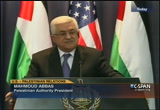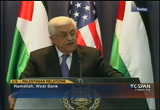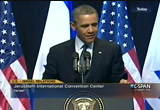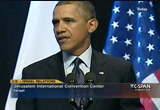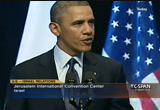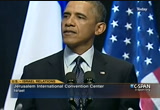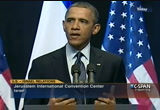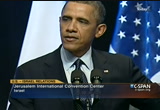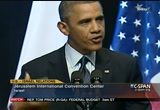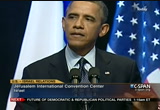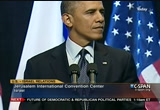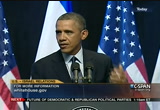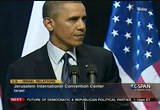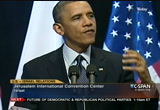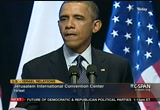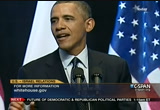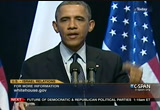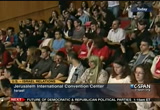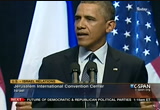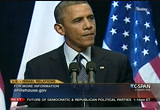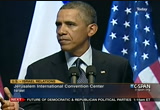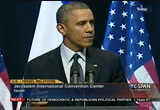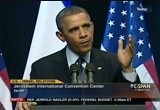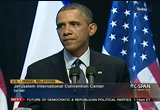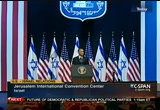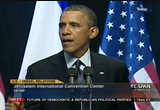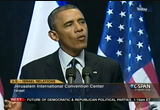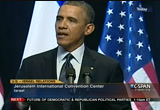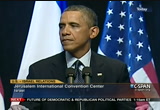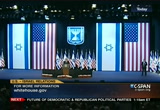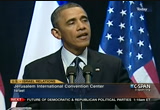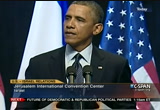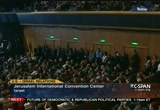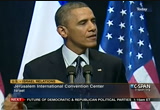tv Capitol Hill Hearings CSPAN March 21, 2013 8:00pm-1:00am EDT
8:00 pm
>> tonight, a look at the iraq war which began 10 years ago this week. first, president's 2003 speech at the start of the invasion of iraq. then, today's discussion of the iraq war and its effects from the carnegie endowment for international peace. later, president obama meets with palestinian authority president mahood abbas -- mahmoud abbas. u.s. forcesago, invaded iraq with the mission of overthrowing the regime of saddam hussein. at the start of the invasion president bush addressed the nation from the oval office. >> my fellow citizens, at this hour american and coalition forces are in the early stages of military operations to disarm iraq, to free its people and to
8:01 pm
defend the world from grave danger. on my orders, coalition forces have begun striking selected targets of military importance to undermine saddam hussein's ability to wage war. these are opening stages of what will be a broad and concerted campaign. more than 35 countries are giving crucial support, from the use of naval and air bases, to help with intelligence and logistics, to the deployment of combat units. every nation in this coalition has chosen to bear the duty and share the honor of serving in our common defense. to all of the men and women of the united states armed forces now in the middle east, the peace of a troubled world and the hopes of an oppressed people now depend on you. that trust is well placed. the enemies you confront will come to know your skill and bravery. the people you liberate will
8:02 pm
witness the honorable and decent spirit of the american military. in this conflict, america faces an enemy who has no regard for conventions of war or rules of morality. saddam hussein has placed iraqi troops and equipment in civilian areas, attempting to use innocent men, women and children as shields for his own military, a final atrocity against his people. i want americans and all the world to know that coalition forces will make every effort to spare innocent civilians from harm. a campaign on the harsh terrain of a nation as large as california could be longer and more difficult than some predict. and helping iraqis achieve a united, stable and free country will require our sustained commitment. we come to iraq with respect for its citizens, for their great civilization and for the
8:03 pm
religious faiths they practice. we have no ambition in iraq, except to remove a threat and restore control of that country to its own people. i know that the families of our military are praying that all those who serve will return safely and soon. millions of americans are praying with you for the safety of your loved ones and for the protection of the innocent. for your sacrifice, you have the gratitude and respect of the american people and you can know that our forces will be coming home as soon as their work is done. our nation enters this conflict reluctantly, yet our purpose is sure. the people of the united states and our friends and allies will not live at the mercy of an outlaw regime that threatens the peace with weapons of mass murder. we will meet that threat now with our army, air force, navy,
8:04 pm
coast guard and marines, so that we do not have to meet it later with armies of firefighters and police and doctors on the streets of our cities. now that conflict has come, the only way to limit its duration is to apply decisive force. and i assure you, this will not be a campaign of half measures and we will accept no outcome but victory. my fellow citizens, the dangers to our country and the world will be overcome. we will pass through this time of peril and carry on the work of peace. we will defend our freedom. we will bring freedom to others. and we will prevail. may god bless our country and [captioningend her performed bynational captioning institute][captions copyright nationalcable satellite corp.
8:05 pm
>> on the 10th anniversary of the start of the iraq war, the carnegie endowment for the international peace addressed the developments. on the first panel, we hear from former u.s. ambassador to iraq. also, the former iraq h ambassador to the u.s.. >> good morning. i am the president of the carnegie endowment for international peace. it's a pleasure to welcome you today to help us take stock 10 years after the launch a what turned out to be america's second longest war. it is too soon for history. many of the war cost direct outcomes and most of its indirect consequences are both at home and in the region are still unfolding.
8:06 pm
one can certainly see the facts of the iraq war in our current agonized effort to try to decide what to do about syria, both in terms of public opinion and policy makers' thinking. but if journalism is the first draft of history, then 10 years is certainly time enough to step back and reevaluate and perhaps a time for a good third draft. we cannot trace all the defense, -- events, all the issues, and the impacts of the war today. we will not do justice for example to a critical set of questions about how we got into the war, and there is a good deal of revisionist history that has been going around this week on that topic. this is i think critical for understanding what happened and
8:07 pm
why it happened and the central to understanding to avoiding a repetition. it we will not try to treat in detail the impact of the war on the lives of individual iraqis. but we are going to cover a lot of territory, and what for us seemed to be the critical three sets of questions. choosing those, we have one eye on the past and one that is very firmly set on the future. we are asking first what is the state of iraq today, how far towards the u.s.' original goal of a functioning democracy has it come, and what is the outlook for this country in the region, for its neighbors, and that will be the subject of our first panel. we are then going to look at the
8:08 pm
economic costs of the war. you may remember the president bush's economic adviser was fired for predicting that the war might cost $100 billion to $200 billion. he was off by a factor of 10, and as we are going to hear and our second panel, made much more than that. finally, we are going to ask from the u.s. point of view, what are the geopolitical and military and strategic lessons in so far as we can see them from this near and far vantage point? what are the take-homes from this conflict? we have assembled a wonderful first panel. i have no question that however
8:09 pm
much each of us knows about this conflict firsthand and more, looking around this room, there's a huge amount of wisdom here, but i know all of us are going to go home from this a good deal wiser. i thank you for joining us, and i really am thrilled to turn over to the moderator of our first panel. everybody in this room and watching on television probably is deeply familiar with his work. in years ago, he was covering the beginning of the war from kuwait city and from baghdad. he later wrote the apparel life in the emerald city, one of the best of many books about the war, and we're very lucky to have him.
8:10 pm
so the mike is here. >> thank you, and thank you all for coming this morning. to hear what i think is fun to be a fantastic lineup of speakers all day. 10 years ago today, the lead story on the front page -- u.s. forces punched into a broad front tonight, using territory along the kuwait border with moderate resistance. a second torrent of u.s. cruise missiles destroyed several buildings in baghdad. two days ago, this is what a colleague wrote -- 10 years after the united states' barreled into iraq, the country is neither the failed state that seemed all but inevitable during the darkest days of the war, nor the democracy that america set
8:11 pm
out to form. this a country threatened by local conflicts that could drag it back into a sustained but shed its citizens knows so well. that is what we're here to examine this morning. the 13 months after the last u.s. combat forces the part of the country. what is iraq today? is it on the press as up political dysfunction, another civil war? or is it poised to muddle through, killed by oil revenue, -- fuled by oil revenue, competence security forces, and a prime minister who has managed to establish control over a fractious government? or is it all those things? this is not a discussion rooted in the past. we will not relive the wmd questions. we will not dwell on the mistakes of the coalition authority, and we will not
8:12 pm
debate the surge. we will look at iraq today and where it is headed. a has been little of that in the 10 years media coverage, even though it is a far more relevant question for policy makers and the public today. with that, because you did not come here to hear me today, that we introduce the plan all. all on the who they are.-- know who they are. you know their contributions to the efforts to stabilize iraq. to my right is ambassador ryan crocker, who is the kissinger senior fellow at the el sity. sal.-- yale univer he has served recently as our ambassador to afghanistan, his long career included ambassadors for iraq as well as our ambassador to pakistan, syria, kuwait, and lebanon. from may to august of 2003, he
8:13 pm
served as the government's director for the coalition provisional authority in baghdad, and his career in the foreign service included a tour in lebanon at the same time in the early 1980's, at the moment of the it israeli invasion as well as the bombing of the marine barracks. to his right is ambassador samir sumaida'ie. in 2006 he moved here to washington to serve as iraq's ambassador. prior to his appointment to the united nations, the ambassador to serve as the minister of interior in baghdad. before that he was a member of iraq's governing council. he is currently working as a
8:14 pm
consultant and a writer. to the far right, is a senior fellow at the yale jackson institute. she has worked at senior levels on behalf of the united states and united kingdom government and in israel. into this and three, she was the governancehe was the fi director in kirkuk. was best known for serving as the political adviser for general odierno. instead of asking our panelists to deliver a long opening statements, i will ask them to be ready to tackle three questions at the outset before we launch into what i hope will be a robust discussion. the three questions which i will address our to talk about the state of iraq's domestic politics, iraq's role in the
8:15 pm
region and iraq's relationship with the united states. let's start off with domestic politics. iraq today is a tinderbox with red-hot embers inside, disputes about political power. it seems the government is crumbling. the finance minister will not leave the anbar province for fear of being arrested. another has been boycotting government meetings in the capital and remaining in the kurdish-controlled north. and ministers have also to foist that they will boycott the government in recent days. i would like the panel to give their assessment of the domestic situation, and let me start with ambassador crocker. if prime minister maliki turning himself into an autocrat? >> is a great question, and i thought you had a great
8:16 pm
quotation from the article two days ago. iraq is haunted by its past. maliki is haunted by his past, recent and not so recent, in my view. he came out of a clandestine movement that was severely persecuted under the saddam years. that conditions his behavior. it is said in iraq by the prime minister that only two men successfully governed iraq. i do not think maliki is trying to be the next saddam hussein. the politics and conditions in iraq will not permit it. he is afraid he may be the next
8:17 pm
kassam who overthrew the monarchy in 1958 and who was a pretty able political figure. he was making deals, breaking deals, bestowing a favor, withdrawing favor, but eventually it got away from him. to read maliki correctly, the best perspective is someone who is playing defense, who is trying to stay in power, who was trying not to go the same way as kassam. >> thank you. ambassador, let's talk about sunni politics. there have been large demonstrations. what are the chances that the current state of sunni frustration , anger, sense of disenfranchisement will spill into something more violent and destabilizing?
8:18 pm
>> it is already spilling out into violence trick we hear every few days of explosions, acts of terrorism. they're not totally disconnected from the general dissatisfaction of the population, and there is a great deal of dissatisfaction among oust the iraqis about but i want to elaborate on that. get back to the mindset of the government. i agree totally with ambassador crocker's assessment of the way maliki thinks, but i would like to add to it that iraq is a state -- whoever controls the resources controls the system of patronage that builds the power
8:19 pm
structure. in a state like the united states, the population pays taxes and the government is accountable and that system is not there in iraq. whoever oversees oil seizes power. that is a major factor in conditioning the mentality of the group that rules. they put their hand on that and they will not let that go. coming back to the sunnis, i remember growing up in a country where the sectarian divisions were not really relevant. we did not who was sunni or shia. a sectarian policies of saddam's regime and the oppression he imposed on the shia, this sense
8:20 pm
of being persecuted was strong -- shia.he snia. the opportunity came, there was a segment, the islamists, who were thinking now, we have got it, we will never let it go. it will be a shia government. that put the sunnis a difficult position, and in the early days they brokered the political cottedf the polit aical process. that did not work. they then joined in it. that is not working. now they are caught in a difficult position. they do not want to go to the extreme where al qaeda is because they get themselveswere
8:21 pm
victims of al qaeda. at the same time, they are being marginalized and being treated as second-class citizens. it is very difficult. i must say that their general dissatisfaction is a much s is part of a much wider dissatisfaction. they will feel that there are no services, no security, no progress, no jobs. where on earth are we going? the country seems to be in this situation where it is not moving at all. >> fantastic. much to delve into, and the circle back particularly on the allocation of will on revenue of --oil revenue and broader dissatisfaction. tell us about the state of kurdish-era politics at the moment, all these concerns that
8:22 pm
moves by the kurds enter in selling their oil from the north and or i should use that word carefully there, oil, oil extracted in the northern parts of the country and their efforts to sell that further stoking tensions with the central government. help us understand as well as obviously key unresolved land rights issues of in the north, help us understand where things stand today. >> at one level kurdistan is the success story of iraq. there is much more employment. people feel happy and they feel is in better than they have had in the past. at one level this is the kurds' moment. the nation's between kurds and baghdad have never been so poor. there is an absence of trust
8:23 pm
among the elites in iraq. this boils down at the moment to personal disputes between the president and maliki. kurdish leaders fear that maliki is becoming an autocrat. their sense of history, they are affected by it in the same way that maliki is affected by it create the kurdish sense of history always make them fear the central government, and they see the tanks, the f-16's could be used against them, so there is a huge distrust. before it was president talabani who served as the mediator between the president and maliki. and now there is nobody who was brokering that this agreement. there really are substantial issues to be dealt with.
8:24 pm
the issue of land was supposed to be resolved after the constitution. it has not been resolved. in those disputed areas, if they become part of kurdistan, all this that should have been put in place have not been put in place, whether a sense of referendum, none of that has happened. the kurds are frustrated in thinking that is never going to happen. you also mentioned the oil issues, and the kurds have been exporting their oil, as you call it, three trucks to turkey, three trucks to iran, and there is talk now about a direct pipeline between turkey and kurdistan. they have been giving out will contracts to international companies, and some of those contracts have been for building a in disputed territories. the central government is a
8:25 pm
great concern because they fear that if the kurds can have a direct pipeline with jerkily,-- with turkey, that will lead to the breaking off of iraq. we sell in the months last year and the year before the movements of iraqi security forces facing off against each other in the disputed territories. when u.s. military was there, it served as a mediator between the different forces. now there is no mediator and there is concern that it only takes one shot to get the spiral of action. recently, the budget was pushed through parliament without the agreement of the kurds and with many of the iraqi members boycotting it. but that is what has led to the kurdish boycotts of government because they fear that maliki does not want to share power, they now fear they are not equal
8:26 pm
partners in iraq. we're back at the beginning in 2003 and 2004, where we heard kurdish leaders say now for the first time i feel iraqi. more and more the kurds are becoming autonomous, they are seeking economic independence from baghdad, so they are drifting further and further apart. >> so much there. we could spend the next hour just following up on this stuff. i promise we will get back to all of it. i want to talk about iraq in the region and iraq and united states and we will circle back. it obviously it's to much concern about the relationship that has been forged over the past several years between baghdad and tehran. ambassador crocker, give us your sense of the true nature of the air around iraq and iran today.
8:27 pm
>> if i could give you an accurate assessment of the true nature of the relationship between iran and iraq today, it would be elevated to a celestial status. which may happen, but it will not happen this morning. [laughter] it is a highly complex relationship. there can be no question that following the withdrawal of all u.s. troops in 2011 and to speak frankly i think a waning of u.s. engagement at other levels, it has shifted a balance showed that -- so that iranian influence in iraq is greater than ours is less strict there's no question about that. at the same time, i do not buy into the tendency in the west
8:28 pm
and in the united states that iran calls the shots and gives the orders because it is, one, a shia government in tehran, dealing with another shia government in iraq. i think that differences that we often lose sight of between arab and persian, the, again, history, history, history, the bloody history between iraq and iran, the brutal war of 1980's, which we tend to have forgotten, but no iraqi or iranian ever well, remains fresh in the memories of the questions. iraq is, whether sunni or shia,
8:29 pm
is profoundly an arab state and for many years was the vanguard of arab nationalism. i think we are going through an interval here wear because people lack a regional or international balance, iran has a disproportionate influence in iraq, but i think the farther they pressed that influence, as i saw during my time there, the more iraqis tend to push back and resent it. so i would seek probably a prolonged period where this will play out. iranian coverage is going to produce an iraqi backlash. they will have influence. they will not have control. >> let's talk about syria. there is a tendency here in washington to view maliki's
8:30 pm
acquiescence to overflights because of pressure. maliki has his own reasons for wanting to have assad in power. is a kinship between shia and alouites, is a concern that if his government is toppled it puts pressure on sectarian tensions within their record to help us understand why the maliki government is taking the position it is, regarding the conflict in syria. >> you look for simple explanations. many international jihadis entered iraq and committed acts.
8:31 pm
whether they facilitated or not, they did not stop it. in 2009 after a particular set of horrific bombings, maliki wanted to take them to a criminal court. it looks like rushing, when-- hen am's regine, and we people see an uprising in spirit, it looks like iraq in 1990, 1991. how did this come about? it is simplistic to say that -- more the issue is maliki and shia is they must see the threat -- islamists in iraq see the th reat
8:32 pm
facing them in the same way that iran sees the threat, and by the threats, i mean this fear of the sunni regime's getting together, coming together to overthrow the shia regime of assad and then overthrowing the shia regime in baghdad. is this fear of the alternative. it is fear is assad is on the turn, that people will come to power of the most salafi branch of the opposition, and that is propagated through the media, in dialogue between people. the relationship between the syria and iraq is very complex because of the different communities inside of iraq have to relations with syria. yesterday when robert ford went testify, he testified about how the iraqi government was not preventing weapons from iran
8:33 pm
reaching syria. he also described how shia extremists were inside syria fighting on behalf of the regime, and there are also plenty of sunnis fighting in syria, and going back and forth, and also kurds inside syria see an opportunity, and there is fear that if assad goes, kurds will become more empowered, and how will that affect kurds inside iraq. they are all interconnected. >> and looking at the interconnections, let's branched out a little more and look at iraq more broadly in the arab world. ambassador, we are more than a year on from the start of the arabs spring.
8:34 pm
iraq has a large border with iran, but also the border is jordan, saudi arabia, kuwait is a player. help us understand how the maliki government sees its relationship with the broader arab world at the moment and how its neighbors, beyond iran and syria, which we have talked about, view iraq today. >> back in 2003, in the days of the governing council, the first senior delegation received from outside iraq was not from an arab country, it was from iraq. there was a kind of denial
8:35 pm
amongst the arabs that what the americans did did actually take place. in some quarters in the gulf region, there is a kind of phobia up here, and that played into the situation, particularly exasperated by the facts that shia political parties themselves looked at this as an opportunity to seize power in iraq, as shia, not iraqi. there is fear on both sides feeding on each other. the iranians proved to be very adept, and they moves swiftly. they utilized their investment in shia islamists who were nurtured in iran during the
8:36 pm
saddam period and built close relations with the leaders of the islamic republic. they never looked back from there. coming back to the arabs, the more they see of this, the more estranged they become from the new iraq. iraq has traditionally been as he correctly said, ambassador, an arab country in its identity, as it looks at itself, but a country with a proud arab history. there is another layer now, a layer of sectarianism, which has been struggling with a layer of
8:37 pm
nationalism. there is one symptom, but at the political level, at the leaders of the islamic parties, there is a different kind of -- and therefore, as we progress from 2003 into the turbulent years of 2006, 2007, the arab press the other arab countries started to point out chaos, failure, all because of the iranians, and the american mismanagement, and we never seemed -- and it was very hard to get iraq back into its arab niche. we got iraq into the arab league, but it remains a work in progress. it is never really integrated back. that is where things stand. there is a recognition that iraq should be part of the arab fold,
8:38 pm
but there is any hesitation between that sense and the sense that iraq is close to iran at the moment and that iranian influence is very apparent at the macro and micro levels. >> fantastic. so much to bore into. would like to talk about the state of the u.s.-iraq --lations, and we will tell in delve into the conversation on all this stuff. it has been 15 months since our last combat forces drove out of the country. there is a large diplomatic presence there. we still have some military personnel doing some arms sales
8:39 pm
and training their and our intelligence community as individuals on the ground. help us understand from your perspective iraq-u.s. relations today, and i would like to start out, if you might offer some thoughts, if the sofa process turned out differently, if we had 10,000 u.s. troops in the country today, would things be ppreciably different?would iraq's relations with iran be different? would they be dealing with syria differently? if we had a military presence on the ground today in the thousands, would that give us any meaningful leverage in the politics of the country? >> i would defer to the ambassador for an iraqi perspective, but it seems to me
8:40 pm
that had those security negotiations succeeded and that we had a presence along those numbers, that is not enough to make a military difference, nor should it be. it would be a powerful signal in iraq to iran and in the region that the united states was engaged, involved, interested, and effective, and i think it would have reshaped calculations in capitals, starting with baghdad, and tehran, and right around the region. again, the military as it were, as a political presence, as a signal of u.s. engagement and involvement.
8:41 pm
during my time in iraq, in addition to the first security agreement, we had a long term should that was intended to send that very simple. it was predicated on the assumption, which i think at the time both governments in the united states and in iraq, shared, that there would be a successor security agreement. the intent on the sides was a signal for the first time since the 1958 revolution that overthrew the monarchy that rock -- iraq was going to be a strategic partner of the u.s. in particular and of the world in general. that agreement still exists, still in force, but i think the full withdrawal of u.s. military, except for the small contingent left for training and equipping, reduced our leverage.
8:42 pm
i would say one other thing. you can still have substantial leverage in international politics without military forces. i am not sure that we have taken full advantage of those opportunities, and i hope very much as we enter a second obama administration that the administration is going to have a greater and deeper focus on the importance of iraq and did engage iraq more fully, more frequently, and at higher levels, because we have seen what happens when the relationship deteriorates, as it did after 1958, and particularly under saddam. with our military leverage gone, we need to take advantage of the agreement to increase our
8:43 pm
political leverage, not to make iraq do things, but to demonstrate to iraq that it has a partner, it has an ally, it has options other than looking to iran for all the reasons that emma sky just laid out. >> there is a limited bandwidth in washington in dealing with these issues, and part of the tragedy of afghanistan, was that we turned so much of our attention to iraq, and with the administration's focus in afghanistan, as well as a broader set of issues, it has come at a cost in dealing with with iraq?- edaling -- dealing with iraw? q?
8:44 pm
>> as has been said in the past, we are a great power and we can do more than one thing at one time. as has been said in the past, we are a great power and we can actually do more than one thing at one time. i think there may be a band with issue, but that is an attention issue rather than a capacity issue. again, we're not talking about deployment divisions. we are taking iraq seriously as our agreement says it should be taken and having the level of senior engagement that we should have in baghdad. i hope we will see that because it has been somewhat absent in recent years. >> how do the people of iraq view the relationship with the united states? >> if you asked an individual, you might get two different answers, so you can imagine if you ask that all of the people. they are conflicted about their attitude towards the united states.
8:45 pm
right from the beginning, some saw intervention by the united states as a threat and some saw it as salvation. those who saw it as salvation later found that they were disappointed in many respects. there were ships, even in the perspective of individual attitudes. the -- shifts, even in the perspective of individual attitudes. there was great elation the set saddam hussein was removed, for sure. at the government level, the strategic agreement is still in
8:46 pm
place, but it would not be wrong to say that the government of iraq at the moment does not see the american presence or influence as an integral part of its political calculation. it was a few years ago when political decisions were taken. they always factored in what the americans fought and that was certainly true. you probably remember when your the ambassador to baghdad. i do not think that is the situation now.
8:47 pm
i would even ventured to say that there is more wait for what the iranian regime things about -- thinks about political decisions in iraq, whether it is forming a cabinet or any other major political decision. but that does not mean that americans have lost all possible influence. i think americans still have a considerable amount of soft power. i think they should use it not only with the government, and they are actually using it, to be fair, in support of civil society. i think in supporting the segment of population who are secular in their outlook, who
8:48 pm
believe that the separation of religion from the state is the salvation of the country, that is the natural ally of the united states, not the islamic side. i think there should be more support for the politics of secularism in iraq. it would not be wrong. in fact, i would say and be necessary and highly desirable for the americans to support their natural allies, which i happen to believe represent the future of iraq and i myself am part of, at a personal level. so, there is this conflict, and this conflict is not resolved on the boards. the outcome of this will depend on how much the united states is willing to put into the right factors to get iraq moving in
8:49 pm
the right direction. if they fail, it will be very unfortunate, but the people who will pay the price will be the people of iraq and american interests in the region. >> very quickly, the european perspective on the u.s.-iraq relationship. >> i think many people looking at that relationship feel that the u.s. wants to forget about iraq, start looking at it through the rearview mirror, look beyond. and people find that quite difficult to understand, after all that investment. huge investments in blood and treasure over the years. when you look at the time of the surge, the u.s. reputation was way high and the iranian influence way low, and now the balance has completely changed.
8:50 pm
people think the u.s. has much more influence and is not wielding the influence it could have. people ask, why does the u.s. not do more to contain some of maliki's worst instincts? why why do they not do a better job balancing the different communities within iraq? and you can ask a follow-up question. >> how should the united states be doing that, and then i would love to hear from the others. how do you all believe the united states should be read calibrating its relationship -- re-calibrating its relationship, and to build on the point, if the natural allies of the united states are those that believe in more secular government, how do you do so in a zero sum nature of iraqi politics without further worsening relationship
8:51 pm
with maliki? >> i think people believe the u.s. bet on maliki in 2010. rather than long-term investments, it was seen as maliki is the guy. but the long term interest is for iraq to be more democratic. it is never going to be a liberal democracy in the gulf. but as the ambassador said, it is a strategic framework agreement which provides the framework to do that, to invest in institutions, to build a better relations with iraq's people.
8:52 pm
there is also the huge influence that the u.s. exerts with neighboring countries. baghdad needs the u.s. to use that influence to help iraq, to help baghdad, to help malick he -- maliki himself have better relationships. and of course, there are the arms sales. will the u.s. continued to just sell arms, sell arms with no conditions placed on it? if those arms are used to oppress mr. maliki's domestic rivals? >> how else should the u.s. --covery that relationship? recalibrate that relationship? >> well, i think it is possible to have a two-pronged
8:53 pm
relationship, even with the government. we will support you, but we will not support aggressive action. we will support you, but we will not accept human rights violations. we will support the political process and the political system as long as it actively serves the principles on which it was felt. -- built. now let me make a very important point of this juncture. at the beginning, when we were writing the traditional -- transitional administrative law and later on when the peace was negotiated, there was an assumption that the players were going to abide by the rules. this assumption was wrong. some had no intention of abiding. they went along, but as soon as they got into power, they
8:54 pm
started flouting the rules, blatantly. i mean, explicitly, it is stated in the constitution of certain institutions are independent, like the central bank. the law made clear that it was independent of the government. i was the head of the media committee, and restructured a media commission that was intended to be independent. all of these have been reined in and the auspices and the control of the prime minister have done it on the basis of, well, these all have some executive functions and therefore they
8:55 pm
should be part of it. they are abusing the semantic definition. that really means a kind of hijacking of the power of all these institutions, which are the guardians of the democratic system. once these have gone, what do we have for this democracy? the americans should make it clear where they stand on these issues. the general perception in iraq is that, well, maliki is in power because both the iranians and the americans want him to be there. that should be dispelled. it should be clear that the americans are committed to the political system in iraq, not
8:56 pm
one individual, not one government. governments come and go, but they must be built on a foundation in order to be sustainable, in order to create the stability and therefore the prosperity that will flow out of iraq. >> what is the clearest way to do that? i mean, we talked a little bit about tariffs. is it time to reevaluate arms sales at this point? >> i think it is time to engage in a serious, sustained and high-level manner. and through that engagement, exert greater influence, frankly, with all the parties. i think they could all use it. and to use as your structure for that the framework agreement, because it is about institutions, their
8:57 pm
strengthening and their endurance, as well as it is about cooperation in a variety of fields that are of benefit to iraq as well as the united states. we have a very able ambassador in baghdad right now, but the nature of the relationship, the recollection of the iraqis over how it used to be, with routine high-level engagement, i think suggests strongly that to get at just the point that have been raised, we have got to of our game here. -- up our game here. i would very much like to see the secretary of state make a visit to iraq. in the previous ed ministration, for a variety of reasons -- previous administration, for a variety of reasons, the secretary did not visit. secretaries of defense routinely visit countries where we do not
8:58 pm
have troops deployed, but it would get everybody guessing, wouldn't it? in a similar vein, i would like to see the chairman of the joint chiefs of staff visit. these kind of visits provide a framework to get at questions like balances, institutions vs individuals, arms sales and their conditions and some useful words of advice, both to those in the ascendancy and to those in the opposition, because as i said, i think all parties need it. yetone individual who has not come up is
8:59 pm
i am keen to hear your thoughts on him playing a constructive role as a shia nationalist figure and potentially seeking to break further from the broader shia coalition and ally his movement with sunnis and kurds, playing the role of a spoiler. would that be a positive development, in any of your views, or a prescription for even more trouble ahead? >> muqtada al-sadr has been a rather unpredictable player on the iraqi stage. he came in on a wave of love and
9:00 pm
admiration because his father was murdered by saddam hussein. his father was a singer, a writer and a clergyman, a remarkable person viewed with great respect. but there were those who venerated him. and this was his son. he was simply swept into a for which heower had no qualifications therefore, he was a
9:01 pm
candidate for manipulation by people who had much more experience, including our iranian neighbors. so, his recent actions -- although i think his instincts were, as you pointed out, much more nationalist, iraqi, helping the board, but his political motivations were all over the map. what he will do the next day, the next month, if you ask them, i think he will get -- again, and answered today and a different answer tomorrow. it is difficult for me to sit here and say how he is going to act, but he is a factor and he will continue to be a factor. the next elections next year are going to show, hopefully, the more mature response from the electorate. having said that, i quickly add the qualification of this will be, again, colored and tempered by the fears of being whipped up right now.
9:02 pm
among the islamist shia, there is a weapon they use, the are coming to get you. and that is now amplified by the sunnis arabs are coming to get you. that makes the fear even more potent. the best things that the sunni arabs in iraq should do is try to alleviate this year. most of the wider element is aware of the danger of this fear, of government out of control. coming back to muqtada, the next elections, if they are not
9:03 pm
colored by a fervor, might produce a more mature out, and provide a new crop of younger leaders who have been less contaminated by the events of recent years. there is a ray of hope there. >> if i could just add to that, i agree entirely with the ambassador's assessment of muqtada al-sadr. he himself does not know what is doing the day after tomorrow. sadly, assassination can be very effective and the assassination of his father and two brothers has had a lasting effect on iraqi politics, as has another
9:04 pm
assassination. in the sadr family, that once stood not only for a moderate form of shia some but for iraqi and arab nationalism, we are now down to be shallow end of the sadr gene pool. [laughter] when was a period in 2008 the hope was, which yo articulated, that dsadr, to -- that sadr would make that out
9:05 pm
reach over the sectarian divide to the sunnis. it never really happened, to the immense relief of the kurds, therein lies the complexity of all of this. you can manage to make perhaps two out of three reasonably content, that getting three out of three has deluded us and the iraqis for the last decade, and iraq for the last century. there is a point of light to come back to with respect to the u.s.
9:06 pm
not only do i believe we need to be more effectively and decisively engaged with iraq, i believe we need to be more effectively and decisively engaged with the region on behalf of iraq. i made what i thought was a pretty persuasive talking point that if you are concerned about iranian influence in iraq, why don't you reopen your how foreign minister's visit, invite iraqis to your capital and pushed back on persian influence with arab influence? it persuaded the, but persuaded no one else. as the region changes through the arab spring, i think this is again a time for more active u.s. diplomacy in the region on behalf of iraq.
9:07 pm
>> i like to add a follow-up comment here. i agree entirely on this. but muqtada should not always be viewed as a free agent. in a recent episode when there was an attempt to unseat maliki in parliament by a vote of no- confidence, initially muqtada signed on on this action and this plan, but later withdrew. the affirmation i have is that he withdrew because so few of his lieutenants -- because a of his lieutenants came to him and told him they could not protect him if he went through with this plan. i don't know, but it is the least -- it at least explain
9:08 pm
some of the capricious nature of his decisions. he makes a decision today and then he changes it tomorrow to another thing. >> can i just make one final comment about muqtada? he is hard to read, but in the last few months, there has been a maturing in his behavior. he has chosen not to be more sectarian. he has chosen to reach out to the kurds and reach out to be sunnis. you have seen him going to lebanon. you have seen a change in his behavior, and he could have acted differently, so he deserves some credit for that. >> his instincts are right because he was brought up in that family. and this family is rooted in iraqi culture and history and is seen, unlike some of the others, as being very iraqi and very arab, and for that reason, is loved by sunnis and shia
9:09 pm
alike. my comments of referred to iran in a negative sense throughout, but it is important for iraq to have a working relationship with iran. we have historical, cultural, family ties with iranian society and we have religious ties. and we have every year hundreds of thousands, if not millions of pilgrims who come from iran to visit the holy shrines in iraq. so, a healthy and positive relationship between the two countries is absolutely essentials. it has got to be done in such a way that it is free of domination, that it is based on mutual respect and independence. in the current situation, that is a little difficult, but that is what we should be aiming
9:10 pm
toward. >> that is where the u.s. comes in again. one last question and then i will turn it over to all of you. i think it would be a safe assumption that the three of you would be in favor of a more secular arab iraqi gun -- secular iraqi government in the future. the results of the last election are not lost on all of us, but as one looks for that as sort of an aspiration, is the better approach one that actually seeks to build institutions and promote the motion of -- notion of a more secular form of government and essentially seeks to empower and this is leaders with more -- assist leaders with more secular tendencies, or is the reality that we are going
9:11 pm
be facing, for the foreseeable future, sectarian and ethnically divided politics, and that they have to some sort of greater political stability has to -- a path to some sort of greater political stability has to involve a degree of negotiated political compromise within the factions and saying look, the idea that you are going to get enough individuals from the principal constituencies into some sort of big tent is unrealistic, and got to be more progress on the sharing and distribution of oil revenue, a distribution of political power, and recognizing this religiously
9:12 pm
and ethnically fractured challengend it is a of seeking to build the appropriate compromise? >> if i could start. i think it is a bit of both. first, recognizing reality for what it is in iraq today. we have had our utopian vision for iraq. it has not worked out well, not for iraqis and not for ourselves. first, we need to recognize reality and then see how we can work with that reality to build a better future for iraqis. i do not think the united should be in the position iraq or elsewhere of taking a
9:13 pm
position in principle that we oppose religiously based parties by definition and will only favor secular parties. i think that is highly dangerous. there is nothing inherent in a religious party, whether it be on the shia side or the iraqi islamic party on the sunni side that is contrary to a national vision for iraq. it is the way events and personalities -- and i think the emphasis on personalities is extremely important -- have evolves that have created some of these problems.
9:14 pm
we have got to be careful how we approach that. not only because i negotiated it, the strategic framework agreement gives us that vehicle to move forward. set aside the identity of parties and focus on the development of institutions, the development of a pluralistic approach, the knowledge that iraq ultimately succeeds as a whole or will fail in its parts and move on from there, but that requires a level of senior u.s. engagement that we have not seen and badly need. >> ambassador? >> for the first time i have to disagree with ambassador crocker. >> thank god. >> ideologically, religious parties are by nature sectarian, and sectarian politics is divisive, and they are incompatible with a vision, in my view. this has been proven in practice. people who see themselves as champions of this sect or that sect cannot see themselves or
9:15 pm
be champions of the whole nation. in this country, you have two major parties, one protestant, and one catholic, and you see what happens with that. in iraq, we have paid the price and had paid the price of the american view of how workable this is, because it is not. let me just go back to a couple of squares. most of the people who are now leaders in iraq were born and grew up during saddam's regime, which lasted for about 35 years. people were conditioned by the way the government was run, and by this highly entrenched and the effective system of splitting the goodies of money
9:16 pm
9:17 pm
and you got to play like this. fine, that sounds good. when they are actually playing, they are automatically drawn to the way they were born under. this is what happened, particularly because some of them came with a sense of grievance, and now it is their chance. what did saddam do to conciliate his power? he seized power. it worked for him. and the newcomers, exactly the same. interior,minister of defense, and effectively the minister of intelligence. hardly anything goes by the security front that does not go past his circle, and oil and revenue from oil is effectively run by him.
9:18 pm
i remember the discussions in the governing council. there was a huge pressure from the parties come from the islamist parties in particular, to appoint as many of their followers as possible, not only to positions of responsibility and leadership, but also to fill the ranks of the security other government. i'm sorry if i take one more minute. now it is nearly -- most of these appointees are from political parties.
9:19 pm
you want the job? go to the police. it is now a system of patronage, which was exactly the same structure. when you look at the superimposed, superficially superimposed structure of political relationships, which we now called democracy. look underneath, look beyond, and you will see the reality that really to a larger extent than you expect resembles the ugly face of the saddam regime. >> 2010, people were voting for parties that were not running on sectarian platforms, and you saw the iraqi people wanting to themselves that way. unfortunately, the opportunity
9:20 pm
that the u.s. had to negotiate a new political dispensation to break the sectarian constructs, to get a new agreement, was missed. and the same dysfunctional system is in place. what i fear coming into the national elections, scheduled for 2014, is that you probably will end up with maliki as the largest coalition, but is unlikely to get enough votes to get the support of the parliament. there is likely to be no
9:21 pm
consensus candidate in opposition so you have and acting prime minister with everybody else acting because the system is now filled with the same elites. >> great opportunities as well as challenges. >> time for a few questions. do we have a microphone? hold on one second. thank you. in the white shirt. >> if iran does get the bomb, which i believe it will despite of the sanctions regime, what will be the impact on sectarian politics in iraq and regionally in general? >> thank you. >> it was a question that came up during the time i was ambassador, and samir will obviously have views of his own. worryot find that iraqis too much about the bombing in iran. remember the prime minister shrugged and said they are not going to drop it on us. it will blow back on them. farther afield, it is somebody
9:22 pm
else's problem. if you share the analysis that one of the consequences of iran getting the bomb would the a new round of proliferation, the saudis would not accept that, but if they could get a bomb, and they certainly could buy it, then you got a new element of instability in the region, but one in which certain elements the population in iraq might not be adverse to. >> iraqis did not lose much sleep over this issue, actually. i agree with ryan here. this is not an issue for iraqis. we obviously do not like the idea that iran has a nuclear
9:23 pm
bomb, or any neighbor having a nuclear bomb, and that the general feeling in iraq, we would rather have a nuclear- free middle east. we have managed to rid ourselves of any weapons of mass destruction -- [laughter] and iraq is committed by its constitution to be free of such weapons, and we would rather be living in a neighborhood which is free of these. >> if presidential elections are postponed in anbar and another province, what message will that send, ambassador? what does postponing the election does to the morale of iraqi voters, and is as a foreshadowing of how the national elections go, and did you think increased diplomatic
9:24 pm
engagement could change the outcome of that decision that ms. sky spoke of? how does the rest of the world see us? is it somehow that the u.s. is failing in the process, or does anybody care? >> that sends a negative message if elections are postponed in two provinces. the question is then, will there be elections soon or never? i do not want to make more than my fair share of time, but just that as the current government tried to prepare for the next election, this comes back to the system of patronage. it is well rooted in baghdad and the southern areas, but not yet established in the sunni areas. it would not be a good thing, definitely.
9:25 pm
>> and i would first, and going to the second part of your question, i would like to think that high-level, intensive u.s. diplomatic engagement could prevent that kind of outcome, because there are two places it could happen. either the central government could -- too much instability, cannot have acceptable elections under the circumstances, or you could have a boycott. we are not going to play. it would either be a highly undesirable outcome, and sometimes it takes a third to cause everybody to take
9:26 pm
a deep breath and let the emotions pass. i would like to think we could be helpful. >> it is important for the legitimacy of the elections that they happen at the same time throughout the country, that international observers are able to monitor, because if some areas are excluded, monitors not there, people will not trust the results. >> in the red here. >> thank you. i think it is very unlikely that this administration will reengage in a serious way in iraq, but it seems to meet, based on what that two
9:27 pm
ambassadors have said, that we need to step back and look at a larger strategic question. samir said iraq used to think about what the u.s. would say. now it thinks about what iran would say. that is true throughout the region. maybe it is not that case, maybe libya, but everybody else is like a damn about the u.s. thinks and is doing their own thing. >> not to that extent. >> but to a large extent, we have very limited influence, part of that is as a result of the chaotic mismanagement of the iraq question. so aren't we looking now at an iraq where we have become attached to the man again who used brutal, brutal means as a savvy politician to consolidate power and is a dictator -- are
9:28 pm
we not looking now at a time when we are going to have to really wait for the post- ahmadinejad, post-maliki. and for a moment with the u.s. and iran generally engaged, said the u.s. can force events inside iraq? 34since we have been waiting years since the islamic revolution in iran for such a moment, i am not sure that is a feasible strategy. if our influence is at a low in the region, i would suggest that that is because we have not chosen to use it. we are a great power. we are seen throughout the world, including the middle east, as a great power, so we are largely seen as absent on key issues in key countries at key times. i think for the dynamic to
9:29 pm
change that you described, it is not a question of waiting for maliki or ahmadinejad to go, it is a question of whether we are going to start punching at least up to our weight again. >> a little further back. yes. >> could you give us the view from turkey and baghdad and the relations between maliki and erdogan, where turkey has gotten closer to the kurds over the past three, four, five years? the will hand that over to ambassador. >> well, this is interconnected with the turks supporting the sunni, iran supporting the shia, although reality is never simple as that.
9:30 pm
the kurds have a working relationship with economic interests, and that also has the potential pipeline to exploit oil from iraqi kurdistan. the complex set of issues. also turkey's support of kurds in the last elections, overt support, was irritating for the supporters of the bloc of the current prime minister. there is an accommodation of a sense of mistrust and exasperated by what ryan explained at the beginning, this paranoia that the people are conditioned by saddam's and now they see
9:31 pm
everybody as co-conspirators to go after them. that is the problem. >> time for two here, in the front. >> i am affiliated with the u.s. congress. my question is do you see the development in iraq similar to the balkans tragedy, and especially the ethnic cleansing and so on? if so, what are the preventive
9:32 pm
measures that should be taken in advance in order to prevent a serious tragedy with a civil war? thank you. >> let me begin. one can certainly make the point that the most vicious conceivable ethnic cleansing has already occurred in the 2006, 2007 period. as samir has pointed out, iraq does not have a history of sectarian strife. you go back to the beginning of the 19th century when the -- toand the sunnis helped drive them off. >> that was the exception, not the norm.
9:33 pm
>> at that point, the iraqi sunnis helped -- >> some did. it is the exception, not the norm. iraqis were horrified by the excesses of that time. that helped to break the recurrence of such violence, but we have clearly seen in the last year or two an increase in both sectarian and ethnic shia and sunni tensions, and ethnic strife between arabs and in some cases sunni and shia, vis a vi, the kurds. again, this has not led to large-scale violence. i keep beating this particular drum that you tell me will not
9:34 pm
work, but i will be to it anyway. this is a good moment, a crucial moment, for senior-level u.s. engagement to help the iraqis avoid what they want to avoid, which would be any kind of return to that kind of horrible violence. >> i agree entirely. i think sectarianism in iraq goes against the grain. it is an aberration and a tragic aberration. having said that, it is actually helping, and recently in the last couple of weeks, i have heard of reports of the return of some aspects of ethnic cleansing coming back, which is a dangerous sign, but this is not the community at large, it is extremists in this community, and extremists in that committee using that. the general population is not in
9:35 pm
favor of that. >> one last quick question, all the way down there in the aisle, the gentleman in the white shirt. thank you. >> thank you very much. i'm a student in washington, d.c. my question is, and it may be optimistic, but i am always optimistic about the future of my country. how do you view the strategic vision of iraq for the future, maybe, some people view it as a balancer prior to the invasion in terms of the region, especially iraq would not bandwagon with iran or the united states, but what would be the strategic vision for the future?
9:36 pm
thank you very much. >> i did not quite get it. >> can you paraphrase it? >> iraq's strategic vision going forward. >> consensus is that we will somehow reach the next election, but it is painful, and the next election, a lot of people are hoping that they will something which is different, all the factors indicate that this something different is not going to be radically different. whether it will turn down or turn up, that remains to be seen, but i am an eternal optimist.
9:37 pm
>> we have run a little longer. please join me in thanking our panel, not just for what they have done here this morning, but for each of them, their years of service in the effort to try stabilize iraq and try to create a better future for the iraqi people. all three have served at great personal peril in a variety of positions that have made an enormous contribution to the future of iraq, and it is for that principally, in addition to their comments this morning, that i think we should give them a round of applause. thank you. [applause] [captioning performed by national captioning institute] [captions copyright national cable satellite corp. 2012]
9:38 pm
>> thank you. the next part of the program has to do with a dressing some of the economic causes of the war, we do with addressing some of the economic costs of the war. there is no one better than the , who is a senior lecturer at harvard. she is best known as the author of the 2008 book, of the three trillion dollar war, the true cost of the conflict.
9:39 pm
it casts a spotlight on the direct and indirect cost of the war. she is one of the leading experts in the united states, studying the cost of war with a particular focus on long-term costs relating to weapons. on has written extensively topics of wartime spending and its impact on consideration. she is also contributing to the recent cost of war project, which has established a website following these issues. we are fortunate to have her address this legacy of the iraq war, a war the officials testified at the time has paid for itself.
9:40 pm
these join me in welcoming professor. [applause] much for thevery kind introduction. i am really pleased to be here today at this wonderful institution. for thispreparing talk, i was reading some of the papers from 2000 to end 2003, particularly by jessica mathews, and they argue compellingly -- they were some of the few voices arguing compellingly that the u.s. had other options they could have pursued. as we all know, the advice was
9:41 pm
ignored, and there were a number of other voices of the time that called for restraint. there were a number of voices and suggested the war could cost far more than we anticipated, but as is typical, those most in favor of going to war our most optimistic about how long it is going to take and how much it is and you mayt, recall 10 years ago we were told the war needed to happen quickly before the summer became too hot for our troops and that it would be quick and cheap. 10 years later the decision to ignore it has cost us. you may recall before the war the bush and ministration predicted the war would cost
9:42 pm
about $50 billion to $60 billion. that was the estimate from donald rumsfeld and dick cheney. the top advisor in the bush administration was fired for saying the war might cost of to $200 billion. larry wrote a book in which he argued many of the problems that occurred early in the war were related to the fact no one early on was willing to confront the true potential cost in those early days. today the u.s. has spent two trillion dollars in direct outlays for iraq. at this point, as we are thinking about the difference between 50 billion and three trillion, i usually remind my students about the difference
9:43 pm
between 1 billion and one trillion, up because they sound the same. thinking about it, we know if you had a million thousand dollar bills stacked on the table, it would be 4 inches high, and 1 billion would be 350 feet, which the washington monument is 555 feet, and the capitol dome is 258 feet, so it is in that range. one trillion is 55 miles higher. three are really talking about an order of magnitude bigger when we think about the war costs. cost is just aet fraction of the total cost. there are many causes. there are costs to the region. there are opportunity costs, but this morning i am going to focus
9:44 pm
on three areas of implications as follows. first i want to argue one of the most significant challenges to future u.s. security policy is not going to stem from an external threat but simply coping with legacy of cost from wars we have from already fought. second, i will argue the cost of war are not only hide but unpredictable. the iraq war cost more than estimated, but it also set off a chain of events that have far reaching and economic consequences, and third, we discovered the u.s. lacks any kind of system to track work costs, and by ignoring the costs, and we made it much choices. make poor let me turn to the legacy of
9:45 pm
costs. the legacy is a long-term commitment we have made to members of the military and their families. historically, the war costs always come to 30 years to 40 years after the war. the peak was in 1969, more than 50 years after armas dies. the peak year for paying world was inveterans benefits the late 1980's. payments to war veterans is still climbing. even the first gulf war, which lasted a few weeks, is a war that cost us more than $5 billion a year in disability benefits, which is twice the annual cost of paying for national parks.
9:46 pm
magnitude of future expenditures will be much higher for iraq, because this war has been characterized by a more generous benefits and new expensive treatments. between 2001 and today, the department has increase in real terms from $61 billion a year to $140 billion a year, so from 2% of the u.s. budget to 3% of the u.s. budget. much of this growth was due specifically to the iraq and afghanistan war. when i speak about veterans, i am including iraq and afghanistan veterans, because so many of the veterans fought in and the v.a. does not keep statistics separate. when you think about many of the
9:47 pm
injuries and traumas that have occurred as a result of the past decade of war, it has been the accumulative effect, for example posttraumatic stress after severe fire fighting in iraq. not want to overlaid and you with statistics, but i am about to, so let me go through a few numbers. since 2002, the number of men and women who have been deployed to iraq and afghanistan is 2.5 million. 1.5 6 million have returned home and left active duty and become eligible for veterans care and benefits. we knew looking at the history of past wars when joe's a good and i were writing in 2008, we
9:48 pm
knew there would be it long term cost consequences. we predicted the cost of medical benefits would grow. predicted know by today 45% of veterans would be receiving medical care in the va and the 40% would have applied for disability benefits. we were wrong. our estimates were far too long. the va is treating not 45%, but more than 56%, which is more than 850,000 people. more than 50% of return veterans have already applied for permanent disability benefits, .f which, 98% get approved this reflects a great deal of suffering. 253,000 troops have suffered a
9:49 pm
dramatic brain injury, of which 20% have been moderate to severe. one-third of veterans returning are diagnosed with mental health conditions, and many times concurrent with dramatic now brain injury. 149,000 are disabled. in addition to veterans' qualify fory also social security. as in previous wars, medical and disability compensation will rise of veterans get older and suffer complications. we have also found that our system for transferring to civilian life is fundamentally broken. the va has been more than $5 million -- $5 billion every year for the past four years to hire
9:50 pm
more claims processing employees and to update i.t. systems, but as you probably read in newspapers, the backlog for claims is more than 1 million, and it keeps growing. veterans of the war, particularly when veterans are suffering from rigid when veterans are suffering from high levels of unemployment, substance abuse, and divorce than the civilian population their age. when you take into account the amount we have already spent for veterans' medical care and disability benefits and all the computer investments, readjustment counseling, etc., it comes to $134 billion, but we estimate there is another $836 billion that has already accrued in these disability
9:51 pm
benefits and social security benefits, and but as the present value of of what we will zero in the next 40 years, not even counting what happens after the veterans retire. to the second part of this cost legacy, and that is being felt in the pentagon , where one-third of the budget is in health-care costs. the department made a series of decisions in the past decade, some to boost recruiting when it ran into difficulty attracting sufficient number of troops into the army in 2004. these include increased personnel benefits, health care pay.its, retirement i do not have time to go through all of these, but for example, to try care system, which serves
9:52 pm
active duty troops who are injured while serving in the war theater. troops before they are discharged or troops that do not meet active-duty and their families. the try care system is the fastest-growing, depending on the budget. from $18has risen billion in 2001 to $56 billion today, and this is largely the result of wartime decisions, including expanding to include national guard and reservists, which you did not before, because they made an out 40% of the fighting force, keeping copays extremely low so the price for troops in retirees was a timeline and -- is a tiny section of costs. during this time common and and now the cost of private sector health care has skyrocketed, so the differential between getting health care insurance
9:53 pm
versus the private sector has to 9: 1. serene to one -- from 3: 129: 1. from 3:1 to 9:1. number ofn, this claims has risen. for example, behavioral counseling rose by 865%, and counseling for the children of troops has risen 85%. medical visits from active duty troops do to skeletal problems grew from 2.8 million to 4 million as of 2009. another interesting factor is the companies that makeup
9:54 pm
tricare are some of the biggest beneficiaries in terms of profits. when i did some work for a couple years ago and wrote a paper on who were the main beneficiaries of the war in terms of profits, i expected to see black water and halliburton, and the usual suspects, but at the top of the list are the three companies that would be the sixth largest contractor if taken together. they have enjoyed an enormous amount of growth with all of these additional beneficiaries coming into the system, but since they have not passed on any of the costs to those , the government has reimbursed all the increases in the actual price of diagnostics and actual utilization of treatments within
9:55 pm
the system is much higher than private sector systems. this problem will increase even further when the affordable care at pushes everyone into buying a medical plan. for all of those who are not insured, particularly guards and reservists, at least 30% according to a recent study, who do not have insurance. it would be cheaper to buy into the system than to pay the penalty for not having insurance. another key decision taken in 2004 in response to the recruiting shortfall was to adopt higher pay scale indexing. previous pay increases were linked to the employee cost index, but in 2004, the department change that to use
9:56 pm
the employment cost index plus 0.5%. this added another layer of costs to the base. for the past two or three years the pentagon has been asking congress to repeal some of these benefits, for example, to increase some of the copays for but politically it is difficult to change these benefits, and there is no likelihood of major reforms. anally, the pentagon has retirement system in place in which we only pay service members who served for 20 years. if you serve 19 and a half years, you do not get anything, which means in the volunteer force, the vast majority, 87% of
9:57 pm
iraq and afghanistan troops will not qualify for pensions through the defense department, and my theory for one of the reasons on the huge pressure on the disability system is the troops get out. i work for a large number of troops at the kennedy school, and the feeling is they served for several years. they do not get anything, but they are not quite the same. the disability eventually becomes a small benefit that takes the place of a pension system. i believe there will be pressure that will add another layer of long-term costs. all of these are in addition to the legacy of needing to replace a generation of military equipment and vehicles, which has been depreciating six times a peacetime rate, not to
9:58 pm
mention long-term commitments, such as the agreement we have signed to support afghanistan over the next decade. together as another $700 billion or so to the cost of the war, and it means the u.s. will not be enjoying a peace dividend. quite the contrary, the pentagon will have its hands tied very much over the next decade, coping with the legacy of these costs. let me turn to this second point. the war has affected the economy as well and left us with a legacy of higher oil prices and
9:59 pm
much higher national debt to. the iraq war costs set off a chain of events that had high reaching consequences. i was speaking about budgetary costs, but there are vast costs into civil society, here and in iraq, economic costs and financial costs, and some of those costs are borne by individual society or society at byge rather than directly the government. there were many of these costs i can talk about, but let me highlight a couple. if we think back to when we invaded iraq in 2003, oil prices to order $50 a barrel. and the markets including china
10:00 pm
and india predicted those would remain in that range for the next decade. oil prices are complicated, but most agree that iraq was one of the triggers of lead to oil prices shooting up shortly after the invasion. oil prices peaked do you since then we have rarely seen oil prices below the level of $100. if jo stieglitz were here, he would argue very strongly that we need to connect the dots, that oil prices contribute to the federal reserve decision to increase liquidity and credit, that that decision played a role in housing bubble, the bursting of which led to the financial crisis. he would argue that it is reasonable to attribute some of the cost of the financial crisis back to the oil price rise which was precipitated in part due to the u.s. invasion of
10:01 pm
afghanistan. particularly in light of the fact that we all know that oil was one of the reasons we went to war in the first place. see in theier to context of today's budget quagmire is is the fact that in an unprecedented move, the u.s. is going all the money that we spent in iraq. this is the first time in history since the revolutionary war when we borrowed from taxes andt we cut paid for an entire war out of debt. so we added some $2 trillion to the national credit card, which is a major component of the nine trillion dollars in u.s. debt that has been accrued since 2001. aboutrse when we think debt and deficits, there are two kinds of deficit. there are those that invest in
10:02 pm
human capital or infrastructure or investing in education, and those which do not, which endanger our future by adding to the national debt. and this war deficit was of the second type. third point that i am passionate about, although it is difficult for many people to be passionate about accounting, but i am passionate about the lack of war accounting. one of the purposes of our book and the several book chapters that we have written since then is to argue that bad accounting matters. the u.s. owes nearly a trillion dollars in what business would call deferred compensation to the men and women who fought the war, but this liability does not appear anywhere on the national balance sheet. we did not account for the value iraqe 6658 lives lost in
10:03 pm
and afghanistan. that is just the troops, not civilians, not contractors, except for small amount of life insurance money. even though civilian government agencies estimate the value of life at $7.20 million, so osha atepa would account for it $7.20 million. we have accrued trillion of dollars and more debt, but we don't keep track of it. theecent years, congressional research service, the gao, the pentagon, the inspector general's and others have repeatedly and loudly bemoaned the fact that we lack the basic accounting system necessary to understand where the money is spent. over the past decade, the military budget has increased by $1.50 trillion. in addition to the money appropriated for war spending. some of that i already identified as attributed to increases in personnel and
10:04 pm
tricare recruiting costs. at the same time the air force and navy have gone up with smaller troops then we have before. the army has grown a little bit but the marines, navy, an air force have stayed the same size. the pentagon accounting systems are so flawed that there is no way to even perform an audit. the result, not surprisingly, is not only that we cannot track war costs, but a legacy of rabbet waste and cost overruns and cro-magnon -- co mingling of war and not more related funds. have spent years trying to untangle some of these combing old accounts, but it should not be the fact that in a city where there are thousands of economists, many of them my former students, that it takes somebody sitting outside the government to track where trillions of dollars have been spent. we have also created a system in
10:05 pm
which congress can and has appropriated vast sums of money for war, get circumvents the entire budget accountability system by calling it emergency money. we have had more than 30 emergency supplemental which have funded the war, and the whole point of these emergency supplemental suspect they are supposed to be for actual emergencies like earthquakes and hurricanes, where the priority is not to pay too much attention to anything except getting the money fast. so the actual requirements for the budget submissions and tracking where the money goes are very loose. shall we have spent trillions of dollars through these emergency supplemental with minimal accountability by either side of the aisle. i want to stop soon, so let me conclude by saying that one of
10:06 pm
the lessons of iraq is that by underestimating the cost and ignoring the cost and refusing to think about how we pay for the war, we made it easier for the cost to grow and to make poor choices. democracy relies on an informed citizenry, but we have truant's of dollars that sort of sneaked up on us without anyone really knowing how much was being spent. we have spent $2 trillion at least today in our pocket money. we have committed at least an additional $2 trillion to date in veterans, social security, and defense spending. if we add any of the micro or macro economic cost, in -- any impact on oil prices, at any impact on the thousands of people who left their jobs to become caregivers, we easily
10:07 pm
reach $5 trillion. if we add in afghanistan costs, which were precipitated by the fact that we diverted 80% troops and money to iraq in 2003, we easily reach $6 trillion. that is a lot of money on which to have almost no accountability, no transparency, and money that is left as poor in many, many ways. that restock their and take questions. there and take questions. yes, sir. >> for those of us who have watched the iraq war both before for those of us --
10:08 pm
>> just raise your voice, please. >> for those of us who watched the iraq war both prior, during, and after, if we looked at before, we can point to certain decisions that were made before the war and certain decisions that were not made. we can look at some of the consequences of those decisions later. in the economic context was interesting to me. he said that because of certain economic based decisions were made or not make, it impacted outcomes later during the war. could you give a couple of good
10:09 pm
examples of how the relationship was on those economic decisions? >> i think that the number one decision that has led to long term consequences is that there were two main decisions with regard to iraq. one was the decision to invade iraq. the second was have to pay for it. the decision that was taken was that we would not, unlike previous wars, we would not increase taxes. we would not do anything special to pay for the war. don't forget that at the time we had $6 trillion in debt. we now have $16 to go in in debt. decision -- $16 trillion in debt. the decision to cut taxes at the same time we went to war was a major decision that has had long term consequences. so much of the discussion that happens in washington now are
10:10 pm
around whether it is the sequester or the budget breakdown, all the stuff the pentagon is dealing with because of the sequester and all that goes back to the fact that the debt has grown so precipitously. the original decision that triggered the debt, and as anyone with the credit card knows, debt begets debt. it was the decision within the first couple of years to add hundreds of billions of dollars through borrowing. i think this is a very important decision because of the fact that it was unprecedented. it was at odds with the way we had paid for wars throughout history. it is hard to argue that we did what we always did, because we did something actually quite different. the decisions in the pentagon about changing the way pay indexing was done, or decisions that were taken at the time for specific reasons, which was the recruiting shortfall, but we did not think about the fact that -- and maybe that was
10:11 pm
the right decision, but there was no conscious decision to think about the fact that if we be bakinge will another half% increase in to pay rises for ever. of money that came in with the war and the rush of the ability to get congress to appropriate anything, we did not think about that. we also did not think about the fact that even though we knew from previous wars that every dollar spent would cost at least another 50 cents in veterans long-term cost. we did not give congress the choice of appropriating any thing for those long-term costs, so we sort of willfully, purposefully underpriced the war.
10:12 pm
>> a couple of quick questions. the unforeseen pentagon budget cost that you talked about, does that -- is that included in the overall estimate of the long- term cost of the war? and the second question is, do you have a new estimate of that of iraqng-term cost, specifically? it sounds like you have gone back and read calibrated some of your estimates. i am assuming that it is higher. is your advice for congress, for policy makers on what to do about this. not just in the future, to take into consideration some of the things you are talking about the were willfully ignored, but is there a way that they should start to plan for or account for
10:13 pm
some of the iraq war costs, the event that they will be around for several years. -- given that they will be around for several years. >> the quick answer to your first question is, when we wrote this $3 trillion work that was essentially based on forecasting from previous -- from previous wars, what we expect the long- term cost is for veterans and military personnel to be. we have now been through -- i personally analyzed 600,000 veterans claims. there are 860,000 claims, so we are well on the way. as part of a team at the university of california san francisco medical school, where we analyze the medical, social, and economic costs of each claim. tricare costa allied this part of the new and updated analysis.
10:14 pm
we came up with the number is $3 trillion because no matter which way you counted, the minimum you could get was $3 trillion. we did not include financial interest cost in that. if we had included economic costs in that amount, we could have called it four or $5 trillion. the minimum that could cause is $4 trillion. tricare costs have raul lot faster than we predicted. the brown cost of more study is
10:15 pm
putting it at $6 trillion. at a minimum it is at least a trillion higher. in terms of what to do about it, i have a number of proposals. on the veterans issue, which is where i have spent a lot of my the first major recommendation is that we should be appropriating money into a veterans' trust fund at the time we go to war. right now we under price war. the same as if we sit here is a car for $20,000, but there is a hidden price tag of another $30,000. nobody when actually go and to vote in congress gets to vote on the full cost. i think we should be appropriating at least an additional 25% for every dollar spent. this would have the benefit of making people consider more
10:16 pm
carefully the actual true cost of war, and putting aside money for the inevitable deferred compensation and veterans benefits. i think we should prohibit the use of emergency money. is supposed to be restricted to emergencies or new programs. after 13 years of war, it is difficult to argue this is an unforeseen, unexpected expense. every year, the budget caps that are given in the allocations to congress are set in a certain structure with a certain amount. emergency money allows you to completely must those. it, wead not allowed would have had to confront earlier how we were paying for those wars. third of all, i believe that the pentagon needs a top to bottom investment and cost accounting and capital budgeting, which is
10:17 pm
basic, common sense that is done by most cities and states and all private sector businesses larger than a corner grocery store. on whatcan get a grip former secretary gates referred to as the 30% of pentagon cost that goes to overhead. we are well aware that the sequester is a very crude method for cutting budgets. it is like cutting off your arm to lose weight. it works really well, but it creates some other problems. dietingof the fact that is really tedious and painful and takes a long time. what the pentagon needs in particular is a way of tracking through cost accounting indirect costs. not just the costs of the -- the
10:18 pm
final cost of a weapon, but all the costs associated with developing it and planning for it and evaluating it and securing and reevaluating, auditing, monitoring it. all those indirect costs that add so much to the base. on the v.a. disability claim system. has been obvious to me for a long time that the system is completely broken. least $20ent at billion on trying to fix the bad system. trying to hire people, train them, invest in the i.t. system, etc., and the system is broke. what we should be doing is something closer to what the irs does with taxes, which is that they don't want it all of the taxes, they just audit some of
10:19 pm
the taxes. that enables the system to function. of thering that 98% client approved in the end, we should be simply taking all the new claims, approving them to a minimum level, auditing a small subset, and giving them a final resolution within five years. of bluecrossystem, blueshield, processes 30 million medical claims a year. they'd do 9% them within 30 days, and we should be able to do the same thing. those are some of my suggestions. the gentleman in a yellow tie. >> i am a vietnam veteran who is getting care at the local va. biggest hazard sometimes it is the claims person who determines what kind
10:20 pm
of claim you get. am therefore agent orange related. i had a stroke, and they did not decrease my allotment, but getting back to what you have now, it is like you have in the regular committee. the vietnam veteran, and now .he iraq-afghanistan veterans the vietnam veterans are getting geriatric care, that will drive the cost of a lot. >> i think that the team at the are a top rated team. the way we should be thinking about is the -- is that even
10:21 pm
with the best possible leadership at the va, we really tried hard to make the current system work, but is not working. which leads me to think that it is the system. the system is the grad school application system. you have to fill any huge amount of paperwork, send it into someone who then sent you back something in says you are missing this piece of paper or something. the system should be basically a system that accepts that we cannot emily, in 57 different regional offices around the 25,000 and with disability claim processors, we cannot do it. we needed different kind of system. , part ofened in the va the problem is that general
10:22 pm
shinseki and others have tried to make agent orange and others more productive to the veterans, to recognize the legitimacy and open access to certain claims, but the capacity of the actual process has not been able to accommodate that. so you have a real mismatch. their belief that the technology is going to fix the problem, i believe the evidence suggests that it is not. the gentleman in the blue tide. -- tie. i worked as the united nations spokesman in iraq for five years. i wanted to comment on the hundreds of billions of dollars that was wasted under something called the project reconstruction teams. they would start something and it never goes forward.
10:23 pm
never would it be completed. where did the money go? >> won the reasons that we wrote the book was that people had the sense that we are spending a lot, but it's very difficult to get your arms around what that means. when it comes to the reconstruction money, that is particularly hard to think about. just to put it in context, in afghanistan we spent $87 billion on afghani reconstruction, most of which the pentagon, as they put it, had lost visibility on it. compare that to the national park where we spend $2.5 billion a year to support all of the national parks. if you ask most americans, they
10:24 pm
would say that is a bad allocation of resources. theonal parks versus -- u.s. portion of the reconstruction funding has been around $61 billion. when we look into the ,isappearance of that money what we find is that -- it goes back to this issue of accountability. many of the systems when you go for a pentagon system contract by contract, there are more than 30,000 contracts. the contracts don't require any reporting relationship for a small contracts. so you find that the reason there are so many small contracts is because there is actually no documentation required. find a lot of the contracts that have gone into the reconstruction are classified under what is called
10:25 pm
miscellaneous foreign contracts, which is a kind of black hole. you really have no idea what the money is for. the question is, if you set up a system where contracts under $100,000 don't require any documentation. $25 million they can be called miscellaneous foreign contracts with minimal documentation. becourse there is going to disappearances', correction, profiteering, etc., and we will never get to the bottom of where all that money is gone. what we can do is think about what kind of accountability mechanism we set up to allocate , ward, track, and monitor money. with general mcchrystal last week and he was talking about the scar tissue, as he puts it, created by the wars. one of the things he was saying,
10:26 pm
talking about scar tissue that comes from grown attacks, whether or not they kill civilians. as we were talking afterward he was saying a lot of the reconstruction money had created a sort of scar tissue. it perpetuated the idea that we did not care about money, just throwing money at the problem, corrupt people could get their hands on money. it created this kind of scar tissue, which is another legacy of so much money being thrown at the war with so little accountability. the gentleman in the back there. >> you make a very compelling case, very sound recommendations. things in washington don't involvement.t hill
10:27 pm
do you detect any information from congress with respect to your recommendations? >> i would say mixed. we teach at the kennedy school a newly elected members of congress program. this year i think we had 56 newly elected members, and in addition to teaching them budgeting and everything during the day, i had a whole group of them that met with me privately to go through some of these issues. a lot of interest in what is going on in the tricare and pentagon health care systems. i have a lot of staffers on the
10:28 pm
hill who are contacted me and my students all the time, trying to get information. i have not seen that translate into somebody who would fall on their swords, so to speak, to try and lead a complete transformation in how we think about war costs. i don't see anyone who is about to take that charge. those who have looked at it carefully, for example bob filner, who was the head of the veterans committee who very much embraced reform ideas for the disability system. he left congress now and is mayor of san diego. so some of them have moved on.
10:29 pm
>> [indiscernible] >> two years ago when doug holtz-eakin and i were leading a discussion on the lifting of the debt ceiling, some other republicans who were there actually walked out of the room. this year we did not have that. more willing to listen. wing of theextreme tea party typically does not attend the harvard new members conferences. [laughter] >> among economists, is very
10:30 pm
significant debate about your estimate, and if so, what are would we bees that doing that we would be tangling with you on? >> that is a great question. the original estimates came back to us early on from a former student of mine who was working in the administration and who is a brilliant student from omb. he called me and said i have been tasked with setting up a committee to scrutinize all the numbers in your book and to discredit them. i just want to let you know that. i said ok, fine. he came back to me six months later and said i want to tell
10:31 pm
you we have been through the book with a fine tooth comb. we cannot discredit any of the numbers because they are all on our own numbers. we are going to argue that it was worth it. during that time came out -- argument was not so much around the numbers. the discussion among budget , the amounts are minor. the two main areas of disagreement among economists are should one include the financing costs or not? should one include the cost, if you say my house cost $500,000, you don't usually include the cost of your mortgage, even
10:32 pm
though you know you are going to be paying five% or whatever. around to issue is what extent the war in directly contributed to the financial crisis, oil price increases and so forth. in the oil price area, the oil prices went up by $100 a barrel. we have only attributed $5-$10 off of that amount to the war costs. it withom discussing mainstream people, there is pretty strong support for attributing some percentage of the oil price increase to the iraq war. on the issue of finance and cost, our feeling is that those are direct budgetary costs. they were and president costs .- unprecedented costs
10:33 pm
we made such a radical departure from the way wars had been financed in the past, particularly with the combination of the fact that it was financed off the books due to the emergency supplemental. the reason we called it $3 trillion is that if you exclude all veterans cost and all financing costs, you get $4 trillion already. if you don't include some of the economic cost and include some of the interest costs, you can also get to for no. 2 in, but we don't double count. it is not right to add everything up together, because there might be some double counting be caught between economic cost and interest costs. cost that youimum
10:34 pm
achieve, no matter how you get there. the one cost of the war that i am careful never to a treat is the cost of the gi bill. we see it as an investment in the economy that will produce net benefits as opposed to a net different than .oney we have paid out that is the one area where i would make that distinction. are we finished that go -- our refinished? -- are we finished? thank you.
10:35 pm
>> former national security adviser zbigniew brzezinski criticized the obama administration handling of the syrian civil war and discusses how the west should respond to iran's nuclear program. >> we have explored now and some .ep the state of iraq today we have looked at what the war has cost the american taxpayer and the american economy and how that relates to the fiscal problems that we are facing today.
10:36 pm
we turn now to the geopolitical lessons of this conflict. i think the heart of this discussion. one of the great strengths of this nation, indeed i would say one of our defining characteristics, is the americans' willingness, inclination, capacity always to look to the future, to embrace it. that ability has driven our growth for several centuries and certain accounts for some of our greatest achievements. but it has a heavy cost. and that cost is that we are far too quick to turn the page and to leave our past behind relatively unexamined. edmund burke over 250 years ago who warned that those who don't know history are condemned to repeat it.
10:37 pm
i must say, always thinking about that this week when i read a poll that 45% of americans believe that the u.s. achieved its purpose is in iraq. i had to wonder what those numbers can possibly mean. our purpose on this panel is not to examine the factual record, but to try to get behind the backs and to ask what we have learned positively and negatively in this expensive, literally and metaphorically, war. i think you scour the country you would not find two people that are suited to this task more than those seated next to me. zbigniew brzezinski is well known to everyone as the national security adviser to president jimmy carter. -- he isimportant for
10:38 pm
among a handful, maybe half a dozen of the great thinkers in the united states over the past century. there is no clearer, sharper think about national security active today. he has been of professor at harvard and columbia and at johns hopkins. span more than half a century. one topic they have examined has been the nature communism, totalitarianism, and international security relations during the cold war. increasingly over the past half-dozen years, have been about america's role in the world and a rapidly changing strategic environment and about
10:39 pm
america's interest looking forward. as aly i would add qualification for today's discussion, unlike most former holders of high office in washington, he has been willing over and over again to step outside conventional wisdom when the issue warranted it, taking some risk with his own reputation. theral mcmaster is one of most prominent of a very small, very easily come a very important class of individuals who have earned the title warrior soldier. he, too, has been willing to critically examine the past, and has done so with such power that rather than in his military career, the work has ultimately advanced it. his ph.d. thesis became a widely influential book.
10:40 pm
the title gives you some idea of his appetite for straight talk. he is equally known for brilliance as a combat commander, earning a silver star in the 1991 gulf war and even wider recognition for his iraqss in battles in the war. in the rest of that war, he went back-and-forth between field command an important staff positions culminating in his role as the leader of general petraeus's brain trust on counterinsurgency operations. who think we have to people can really help us examine -- help us not turn the page to
10:41 pm
soon. invite general mcmaster to share his thoughts on the critical lessons that he sees. >> thank you so much. there are so many lessons in our military over the past 12 years, in the wars in both afghanistan and iraq, adapted to what work unforeseen circumstances and difficulties associated with both wars. the first lesson is that we have to make sure we understand the continuities in war and warfare. against what you see is the emerging conventional wisdom about both afghanistan and iraq, that somehow these wars were aberrations because of their complexity, and they were aberrations because of the type of sustained commitment we needed to attempt to forge a sustainable political outcome consistent with our vital interest.
10:42 pm
this is because in the years prior to the war, there's a great deal of momentum that built up, beyond what i would call fantastical fury about the nature of future armed conflict. this was based primarily in the belief that advances in communications technologies, information technologies, computing power, and precision munitions, have completely revolutionized war and work there. therefore, wars could be waged in the future in a way that would be very fast, cheap, efficient, and low cost. mainly by the projection of fire power onto land from the maritime and aerospace domains, but also employing small numbers of elite special forces. and that would provide the answer to the problem of future or conflict. it was an appealing argument, because we would obviously a lot were to be fast, cheap, efficient, and low cost. but of course, as it turns out,
10:43 pm
in both afghanistan and iraq, we were confronted with realities that really demonstrated that thatargument in the 1990's was called a revolution in military affairs. once we confronted reality, we had to adapt quickly to what art for maine continuities in warfare there were certainly evident in iraq. the first is that war is an extension of politics. this is nothing new, and quite a 19th century writer. get to a sustainable political outcome consistent with our vital interests. we perhaps did not do as good a job defining that as we should the in the context of
10:44 pm
dynamics inside iraq and how it fit into the broader political landscape within the region. so we were at a disadvantage in not really having that clearly defined political objective. when you look back at war planning in both afghanistan and iraq in -- and iraq, it is dominated mainly by how we are going to apply military force. the numbers of troops and capabilities and how they are applied on the physical battleground. of course, that should all conform to a political strategy that lays a foundation for all military operations, activities, initiatives, and so forth. so the per se continuity that week we learned is that war is an extension of politics. the second key continuity is that war is a profoundly human endeavour. we talked this morning really about understanding the history.
10:45 pm
what is most important in understanding what is going to be the nature of a particular and character of a conflict is the most recent history. in iraq, these are the factors that were most important, the fact that iraqis had been living under a brutal, murderous regime for over three decades, regina had engaged in a destructive and extremely costly war between 1980 and 1988. un sanctions put an additional strain on iraqi society, while at the same time strengthening the criminalize networks that really controlled the country. the associated polarizing effect on iraq of communities, how they had become pitted against each other, how the regime had used weapons of mass destruction on their own people, and how he
10:46 pm
persecuted the majority of the thelation in the wake of 1991-92 gulf war. and also other factors associated with the return to faith initiatives and the use of the hottest ideology to turn people's frustration away from the regime and toward the west and israel and so forth. had on iraqit that society. so understanding that human dimension of conflict and understanding local conflicts that could occur, how these tribal, ethnic, sectarian competitions for power and resources would play out, and how they are connected not just a national politics but also to the agendas of other countries and organizations. of particular relevance in this case would be syria, iran, and
10:47 pm
transnational terrorist organizations associated with al qaeda. the political and human dimensions of war are extremely important for us to remember and an important lesson for us to carry forward. the other key aspect is that war is uncertain. we heard a lot about the failures to predict the cost of war, for example. not really is not unusual, being able to predict the future, though we do try to do it. american warine planning oftentimes as a bit narcissistic in terms of defining the problems and what we would do only in relation to us. and then assuming what we like to do is not only relevant but decisive to the outcome of the war. it is for this reason that when you go to war, it is very important to be able to take action, to adapt continuously.
10:48 pm
it is this reason why oftentimes if you try to be efficient and more by eliminating numbers of what wasor example, initially a decentralized hybrid, you cannot have a sufficient forces. to establish security conditions and to address the vacuum of power and ruled law that was left after the unseating of the hussein regime. the final of the four main continuities in the nature of war is that war is a contest of wills. we have to communicate our determination to see the effort brew that sustainable outcome consistent with our interest and worthy of the sacrifice and investments we have made in the
10:49 pm
outcome of that work. so overall, i think it would be fair to say that we are oftentimes fixated when looking back on a conflict, on how we did on the physical battleground, how we really operated against the field of forces of our enemy organizations. what we have to do is think about how we operate and how we plan to achieve a sustainable political outcome consistent with our interest. this is a particularly important lesson now, because as we look at the war in iraq, the ongoing war in afghanistan where we still have 66,000 troops engaged every day, there will be a tendency to again define a in a way we war think we can solve that problem in a way that is fast, cheap, efficient, and relies mainly on
10:50 pm
technological prowess. that highlighted important continuities in more for that have to be taken into consideration at the outset. .> i mean this with respect will we ever learned those lessons echoes early in the -- as i about iran listen to you i thought we might well have learned a lot of those lessons. that muchso obvious has changed in terms of the learning, has its? >> that is yet to be seen. ultimately you can make the argument that what we learned from the wars in both iraq and afghanistan will be as
10:51 pm
important as the outcome of those wars. we do we learn these lessons every time we go to war. the question is, will we be at all to understand these lessons and apply them to how we structure our national defense and how we prepare our civilian and military leaders to deal with future threats to national and international security. i think remains to be seen. there are some major impediments to us learn these lessons. one of those impediments is the tendency in the conventional wisdom to view these wars dismissively as wars of choice or aberrations. unless you are going to say that future policy makers will make perfect policy decisions in the future based on your perfect foresight or understanding of
10:52 pm
the situation at the outset, then we obviously have to be prepared. these are determined enemies in very complicated and burns. the other impediment is just -- one of the manifestations is what i call a 8 rating mentality that has emerged from a misunderstanding of what led to the success in 2007-2009, during which we had a very good shot at consolidating gains after that time and getting to a sustainable political outcome that was consistent with our interest and the interest of the iraqi people. future work mainly is about identifying an enemy
10:53 pm
organization in conducting raids against that organization. those rates being conducted by precision guided munitions or special forces, when in fact that sort of approach confuses military activity with progress against trying to sustain -- sustain achievable objectives. you recognize the inadequacy and the danger associated with that kind of approach to future war. in many ways it is to teach it. from the 1920's in a new guise. 2002 with manyof of my colleagues here at carnegie arguing passionately
10:54 pm
that every bit of the classified information available suggested that there was nothing other than some very old chemical weapon shells in iraq, many of which had been shown to be inactive by that time several years before. that the records from past u.s. to change the nature of the government in the country had a very slender record of success and that iraq had none of the characteristics that would lead to success in such a venture. third, the argument was being made that it would trigger a tsunami of democratic transformation across the at best a faith
10:55 pm
based argument. you were not there in 2002, but later he became bge became a very strong critic of this effort. -- you became a very strong critic of this effort. what was it that changed your mind, that led you to make the arguments you did in the mid- 2000's? the nightber vividly when the war commenced. i was asked by the pbs news hour to be there. all of ar vividly sudden the news came that major explosions are taking place in
10:56 pm
baghdad, that baghdad is under air assault, and that the war had begun. i had such a sick feeling in my stomach. i said to myself, i just hope to god that we now find those weapons of mass destruction, because that was the reason why the war was started. i was already by then conscious of the fact that there was a deliberate confusion in terminology used by the administration to justify the initiation of hostilities. for the weapons of mass destruction were alleged to long-e atomic weapons, range capability to deliver them, and chemical weapons, bacteriological ones. everyone knows that the chemical weapons were invented back in 1916 and used in world war roman one.
10:57 pm
they were not used much by the military is actual tools of war. although they were employed by the iraqis against the iranians in the 1980's and there is a and now increasing evidence that they use them in connivance with us. a book came out based on documentary evidence entitled " the making of enemies" which provide some evidence for the proposition that the targeting by the iraqis of the iranian objects, particularly the population centers, was known to us, and we are providing them precise information where to strike, knowing that the effect would be massive casualties. i remember that evening well, because by then i had begun to worry that perhaps what was being publicly asserted was not true.
10:58 pm
but i was not convinced of it. i was uncertain. i was a skeptic. a few days before the initiation of the conflict, -- thatformer officials don't remember exactly who else, but there were several there. we were invited to a meeting with rumsfeld, powell, and rice. i remember asking them, and i was conscious that evening when i saw the beginning of the war, i asked them, how certain are you that the iraqis have these weapons of mass destruction? the answer from all three of them was, it is not a question of how certain we are, we know they have them. that impressed me, because these are people i have known for a long time. when you say you know that someone has something, it means to meet you know. it is not a question of
10:59 pm
probability, it is a statement of certitude. nonetheless, a few minutes later it still occur to me to pursue the subject, so i ask them one more question. if you know that they have weapons of mass destruction, what is the order of battle for their use, and particularly nuclear weapons? obviously if they have them and they are ready to use them, the court order of battle, whoever else has the ability to execute their use. the answer your was perplexing. they said we don't know. i found that surprising, because it seems to me that if they have certitude over the fact that they have them, presumably that certitude would extend to some sources of information that would give us an insight into how these weapons would be used
11:00 pm
in combat. so that evening i was profoundly troubled, and i wrote an article basically arguing that we should until swedenack has had time to conclude research within iraq for method -- weapons of mass destruction. he was being increasingly provided with targets to inspect from the cia. one could assume the knowledge we have was being put at his disposal and he was pleading for that time to complete his reports. to the un and united states and the country's -- countries egging us on. we know what happened
11:01 pm
subsequently. the weapons were never found. the war was initiated on the basis of assertions which were described as an accurate improbably simply as fraudulent. that at stake was american credibility worldwide. that does have significant implications for the position of the united states in the world. the standingsd the united states enjoyed at the end of the cold war and which lasted into the beginnings of the 21st century has been very badly dissipated. that affects us adversely around the world and has serious implications for future decisions that involve war and peace. on the basis of what has
11:02 pm
happened, what level of confidence are we as citizens entitled to have before initiating a war against iran? we do have some parties who tell us there are red lines that should be drawn immediately to read some of these red lines recently drawn have been crossed. now they are being extended by one year. what happens after that one year. and whom are we to trust? on what basis are these assertions being made, how reliable are there -- are they > and are there alternatives to war that could be feasible? we commend this to deter the soviet union -- and managed to deter the soviet union from the
11:03 pm
use of force regarding europe. becausends and allies, the protected them credibly. we made it very clear in advance that we are identified -- we identified our security with the security of europe and that any action would be tantamount to action against the united states. we werehese assurances, directly vulnerable on a huge scale. we once had a false alarm. 85 million americans and soviets would have been dead. i was then national security advisor so i was involved in that. so we have this consciousness of serious responsibility.
11:04 pm
we are doing the same for the japanese and the south koreans. a country that is acting openly in a seemingly irrational fashion. the impact is disturbing in terms of its questionable rationality. delivery systems that cover all of south korea and japan and potentially for the northwesternthe parts of the united states. why is it we can't do that for israel? what does the president have to
11:05 pm
use vacant language about all options on the table, a threat to use of force. why does he have to make categorical verbal guarantees would commit him to the use of that force and create a presumption that he will? at the country been consulted -- has the country as a whole been consulted? could happen. if we wish to protect israel and the threat credible fashion, by karen teas which are binding than those we gave to the europeans and the japanese and south koreans. especially sell -- so vis a vis a country that cannot threaten us. if we do repeat vis a vis iran
11:06 pm
what we did with iraq, qill probably be engaged in a conflict that is more regionally widespread than was the case with the iraq -- with iraq a decade ago. beyond that, let me make one more observation about the nature of war. democracies are very able to wage total war if they are attacked. they are not so good, they are not predisposed. i think they are mentally not prepared to wage total war if they have themself started a war but were not attacked. it is an important psychological and historical difference. we were able to break the will of the germans in large measure assaults on their civilian population.
11:07 pm
yes, of course, it was justified by the need to disrupt transportation, undermine industry, but the great part of the motive was let's break there will buy it burning their cities. the most classical example of that was provided by two single strikes, each of short duration and great teaming casualty -- hiroshima and nagasaki. within minutes, we literally incinerated several hundred thousand people. we were able to do it because we were the victims at and attacked -- of an attack, we did not want to assume the burden of major casualty's for our
11:08 pm
industry. we broke their will and we won the war. but look at the last several wars we have waged. where we were not in a sense the objects of threat from an enemy that could devastate us to reduce settle for a compromise in korea. we withdrew from vietnam and we in iraqprevail fully and afghanistan. if we wish to do so, we could have incinerated their population. but that is something that democracies do not do likely unless they feel themselves totally threatened. in that as an important consideration to bear in mind.
11:09 pm
we are facing the prospect of a regional wars which will arouse populations and not a formal states capable of threatening us. what goes on in iraq today poses no military threat to the united states. but it is a geopolitical consequences of some cost to us. the same is true of afghanistan. god knows what will happen after we are out of afghanistan as a region as a whole. the war will certainly spread to iraq and through iraq to syria, lebanon and jordan. it would engulf western afghanistan as well which is relatively peaceful and where ites lives. the consequences would amass a parody are now facing the possibility the consequences would be
11:10 pm
11:11 pm
ec? >> -- line you see? >> what is important as to understand why the decision was made and how military can achieve an outcome consistent with our vital interests and were the of those sacrifices. understand the character a particular conflicts on their own terms. to try to seek some equivalency between world war ii and the dropping of the atomic bombs and what our response was to the murder of over 3000 americans on 9/11, you can only get limited utility out of that. talking about iraq, we also have to understand that hosthose conflicts of vault over time. it seems in retrospect as we look at the war in iraq, we did not describe in the agency at
11:12 pm
all to our enemies. of the another aspect narcissistic approach we take to understanding war and warfare. it is as if only our decisions affect the circumstances and the outcomes. but the truth is really is we faced brutal, determined, andderous and the mes -- the mes. in the conflict of vault over time. murderous eneies and the conflict evolves over time. they thought it the of the casualty is on us, it would work. then they attacked the
11:13 pm
infrastructure, power lines, water pipes. this is london -- this is lenin's theory. december 2003, he wrote a letter and said we are losing because americans will not be able to identify us but larger numbers of iraqi forces are becoming more capable. this was the iraqi civil defense corps. the strategy shifted to nascent security forces before they develop their decision -- a resiliency to stand on their own. what he said is we have to start a civil war and once we start a civil war by pitting iraq's
11:14 pm
communities against each other, we can gain sponsorship within the communities and use that to gain control of territory and resources and perpetuate a civil war and pursue wrote our objectives of establishing the islamic state of iraq. that was march 2004. from that time on, there was a slowly evolving sectarian conflict. there was a problem of insurgency and transnational terrorist organizations grafted onto the insurgency and the conflict at the time began to evolve into a sectarian civil war that was a in full blast after the samara bombings. to this parites to thities
11:15 pm
just terroristot organizations committing mass murder attacks, increasingly these were shia as lummis islamists -- shia as lumm militias. they took a different approach, got more training in iran and how to conduct assassinations, how to operate in smaller groups sniper attacks and employ ied's. by 2006, the dominant feature of the war had become a sectarian civil war. our strategy had not kept up
11:16 pm
with that. but it caught up with, and understanding of the character of conflict. we developed a political strategy aimed at bringing iraq's internal community's that would remove, support for either shia is lummis malicious -- shai islamist militias. by targeting those were who were irreconcilable among both parties to that civil war. the extremist groups to press stating -- groups perpetuating that cycle. others will learn vicariously and say my best alternative is looking pretty bad. ist we are willing to do now
11:17 pm
advanced are interested politics rather than through violence. the was an opportunity at that stage to consolidate and move toward a sustainable political outcome. .ome of those efforts failed it is important to understand these conflicts evolved over time and were fighting enemies there who have a say in the future course of events and we need to talk more about those enemies. what are they trying to achieve, what are their strategies? family could inform the public about what the stakes are.
11:18 pm
as if everything we did lead to the outcome without any interaction with those whom against weaver fighting. what's left over -- werese whom against we fighting. >> let's open it up to questions now. microphone.for the >> thank you so much. great conference carried general mcmaster, you alluded to two concepts. given the fact the last election was relatively close and one of the two candidates was advised by new conservative given theans and
11:19 pm
previous sessions focused on economic losses, the opportunity costs in afghanistan, how do you explain the prevalence of this philosophy in the american political discussion? we wil take two there on the aisle. >> thank you. having spent five years in iraq where i had the pleasure of meeting general h. mcmaster, i destroyedyou iraq is beyond redemption. almost 1 million iraqis died yet died. the morald bear
11:20 pm
responsibility for what happened in iraq? >> thank you. to dr. zbigniew brzezinski's comments about iran and the presiden'ts statements in israel, i am confused by what he means. i don't think the israeli government is interested in occupying a ron and i do not think the obama administration wants to do so. but it seems the strategy is to make some surgical strike to knock out the iranian pat -- iranian it's your capacity. for an examplee of faith based strategy? you have raised the importance of understanding how the opponent will respond. what is the likely response of the iranians to what is -- to what we hope will be a surgical
11:21 pm
strike? i will deal with iraq and iran then there is another issue i will address. who bears this possibility? i think the answer is fairly obvious. we do. we started the war. the iraqis did not attack us. we went in. some may say for legitimate reasons, others miss a dubious reasons. some, like myself, for fraudulent reasons. we started its of the arrest of will for what happened. i wish we had done better carry it -- we started it so we are responsible for what happened. i wish we had done better. i wonder how they look at us in
11:22 pm
that connection. .very war is murderous geopolitical the and moral consequences. know what ao not surgical strike means. we have not tried one in that set of circumstances. some nuclear facilities are located close to urban centers. what about the fall out? what about without radiation, simply the casualty's -- the casualties. inthe staff and people
11:23 pm
adjoining areas. house surgical will that be? beyond that, how effective will the strike be? it depends on the scale. if it depends on the scale, the consequences of the earlier question depend on that scale. i suppose it has to be repeated. what happens in iran itself? will the iranian people, and joining us in justified outrage, rise in righteous indignation, overthrow the regime and apologize to us for having provoked us into attacking them? [laughter] think the probability of that is not very high. in more likely probability is
11:24 pm
they will join the regime whichcted anger at us could last for decades. but without waiting for decades, we can do some things around the iranians. impeded the access of the world causing incident in the gulf terry we cannot prevent insurance companies from quadrupling the costs of acquiring energy. there is an enormously negative impact on the global economy. particularly in asia. every adjourning area next to iran is susceptible to a local
11:25 pm
war which used to be called people's war. he wanted us to be passively friendly, expecting soviet reactions. likelyasked what is the soviet reaction by the president of the united states? they may state border incidents, we have had lots of them. usn he says they may invade from mongolia where they have 22 armored divisions and strike southward towards beijing directly. he says we will use people's war, and i know what he meant. the kind of things we
11:26 pm
experienced also. people's wars do not adequately . do not end quickly. we are not going to kill all iranians. even if they do these things in the region. the protracted conflict will make this experience a bit -- make this experience of a decade ago seemed like a trifle. therefore i am worried by we are trying to buy off this pressure the president is feeling for commitments to military action against iran without fully contemplating the large scale geopolitical consequences, the affect a loaded the this adventure have no illusions.
11:27 pm
even those who are attacking us egging us on.g they will not be in there with us. it is a bad choice. i don't think the president wants to do it. i think he wants to avoid it. i'm sympathetic to his position but i wish some of our rhetoric was more careful because that could then be applicable in use the toe who favor war as the meeting such a decision. who favor was as to legitimizing such a decision. onward, the 970's
11:28 pm
decision to invade kuwait then the u.n. sanctions that follow that in the effect it had on iraqi society made it all the more difficult for that society to move toward stability in the wake of the saddam hussein regime. i would blame al qaeda and iraq and those who used masss murder as a principal tactic in the war. i would ask dr. zbigniew brzezinski to visit the cities byiraq that were rocked these murderous attacks and ask them who they blame. they blame the people who committed those murders.
11:29 pm
to a cityen we went where life was choked out of it because of a systematic attack by al qaeda, they turned that city into their training base. it is with a connected sniper training, medical training. these are not just insurgencies that happened because people to not like america. these are organizations that mobilize resources and people. this is an enemy organization. courses offer their included kidnapping and murder. they choked the life out of the city. schools have been closed for over a year. marketplaces have a cold. communities have fallen in on haveelves -- marketplaces
11:30 pm
closed. communities have fallen in on themselves. the first lesson is understanding every local contact -- every local conflict on its own terms, understand its connections at the national and regional level. one observation you can make, whether in mali or northern nigeria or syria or lebanon or or pakistan and so forth, is that these groups who are pursuing political agendas by the use of terrorist toacks -- tactics, try gain sponsorship among certain
11:31 pm
portions of the population and use that to gain a foothold and use the foot hole to perpetuate violence between groups. pitting groups against each other. to sit --ecessary was to set security condition to .ring people back together ben to remove sponsorship for these murders and took the pain and suffering on those communities. been thatnce has american soldiers took great risks and made tremendous sacrifices to break these cycles of violence and provide security so those accommodations could be made. it is analogous to what is
11:32 pm
whereing in afghanistan you have a civil war going on, perpetuated in part by a [inaudible]hat of theft key element population outside of the 10th. -- breedinggreeting grounds. as people saw, providing scholarship to these groups means a return to the brutal rule they experience. as soon as they saw there would be victims of that kind of oppression again and saw there there was ansive -- alternative, that broke that sponsorship for those taliban groups. we have been able to consolidate gains in southern afghanistan
11:33 pm
and eastern afghanistan. the same was true in the period after the destructive civil war for a costly war from 2006 to 2008. iraqis began together -- came together. a gentleman right here. >> ticket. -- thank you. since the president is taking his first foreign trip to the middle east, how do you see his policy and can he achieve something in his second term? to keep the focus on the big question before us,
11:34 pm
which is the lessons of a decade of war. given that the general mentioned how war does not often turn out the way you want it to, as the air battle concept would be too much towards. that towards investment would put into iraq -- the and this meant we put into iraq shifted attention from asia? said regarding one of the, with in history, 3 packets of a regime but they were doing this for 3 decads. ites.
11:35 pm
it's only in the end that the u.s. learned of weapons. all regime was brutal \all the time. world one the whole a table. expenditures on iraq affected our ability to operate elsewhere? the united states is the number one superpower. we have the largest economy. so we manage to remain engaged in other parts of the world. but that does not refer to the proposition that the war iraq was excessively expensive, not only morally but financially and physically. and it has not contributed to great regional stability but has
11:36 pm
and has greater regional instability. is phenomenon described increasingly pervasive. murderershere are groups during nasty things, the united states has to go in and deal with it. -- that is the kind of policy that our adversaries would like to see our top decline -- to see our power decline. it would be a gift to them. i'm sure we contain -- maintain
11:37 pm
question of syria. echos about have the kinds of choices and difficulties of intertwined military and political considerations we faced in director >> of syria, we got off on the wrong foot. the president declared publicly that assad of syria has to go. that was a trustee had to make. one would assume that declaring a publicly involves a commitment by the united states, which the united states is prepared then to make effective.
11:38 pm
and that therefore we have the means and strategy for achieving and objective. as soon turned out this was without a real capacity for follow-through. so we went to the un and demanded the security council support us on this. the russians and chinese and said we do not share this conclusion and we will not join you in forcing assad out and we object of the resolution fell. the russians and chinese, having engaged in this stance that is infantile and disgusting, the words used by our ambassador to the un, which is not a way of soliciting their report for further comment policy. it became clear that the , some of it involves
11:39 pm
some of our friends, some of it involves the infiltration of al qaeda types into syria. some of it involves iranian involvement. evident inasingly not have child support of group is capable of organizing an effective military resistance. we announced we will provide money to the resistance troops as humanitarian aid but we would like of the arms. give not know to whom to arms and the first place. but we are going to do some people some money and humanitarian aid.
11:40 pm
whom are really alarming and directly? i think our policy is shortsighted and not particularly affected. the best we can hope for is some international settlement still. in which somehow we will manage to get the russians and the chinese and for their than the iranians to participate. otherwise the conflict will go on and will involve the fragmentation of syria. as well as an impact on iraq, lebanon on, and jordan to rid -- iraq, lebanon and jordan. n> air sea battle is a aerational approach to defeat
11:41 pm
merging enemy anti access capabilities. i am a huge fan of it. abhisit as a soldier, you cannot get anywhere unless to travel by air or sea. -- as a soldier, you cannot get anywhere unless you travel by air or sea. of the joint forces in the position to do what they need to do. to a strategy?t it would have to deal with the four continuities of war we discussed at the beginning. on syria, i cannot really comment on that because i am not an expert at all by any means. the main thing to consider
11:42 pm
looking back at iraq is we have to understand all of battlegrounds contested between us and our enemies. cannot assume that what we decide to do is going to agree -- is going to achieve our objectives or explain everything that's wrong. any comments that go towards the equivalency of what our forces do and what force is due to take a 13-year-old girl and strap her with explosives and half are held the hand of a 3-year-old mentally disabled girl walk into a crowd and remotely that need them, i don't except a kind of equivalency argument.
11:43 pm
this is the battleground where enemies use fear and intimidation to invest their objectives. we also have to be concerned by a bout the ground a perception -- but a bout of perception. we have to become more affected by clarifying our attendance, .xposing their brutality then there is the battleground within governmental institutions we often do not recognize. iraq would have to do in with the consultation of state infiltrations' -- with the infiltration of state
11:44 pm
.nstitutions it made it difficult to strengthen the iraqi state, especially to move towards will of law and effective governance. often we do not even see that. nothing in paris are robert thompson wrote what happened in iraq when the civil war was particularly disruptive is that circuits of iran reusing state institutions to mobilize resources in what became a sectarian cleansing campaign. rgc and ach that the proxies have taken is to make the iraq government dependent to
11:45 pm
.upport syria, the key things to keep into consideration are what are the multiple battlegrounds? an act to be a step towards understanding what could be done to support an outcome that will stop this humanitarian soin in a but do way consistent with our interests. >> there are dozens of questions in the room. i have several dozen more but unfortunately, we have run out of time. i want to thank all of you who
11:46 pm
with us for this discussion, in particular dr. zbigniew brzezinski, general h. mcmaster. [applause] [captioning performed by national captioning institute] [captions copyright national cable satellite corp. 2013] donna brazil and former rnc chair took part in a discussion about the future of the democratic republican parties. they talked about the 2016 presidential race. >> in the next general election, the two leading democrats will be hillary and joe. they will be 70 or over. doesnt' that fly int he face of all this debt ratio -- of this generational talk. is chris christie to heavy to
11:47 pm
run? >> i don't think so. popularhe most republican governor in the country. also john kasich, the governor of pennsylvania. in terms of 2016, this is going to be the first open election on 8.th sides since 200 if hillary tosses her gloves, she will be a very phenomenal candidate. there is a poll in florida today where she beat both marco rubio and jeb bush by double-digit treats. we have an enormous number of good governors across the country martin o'malley, cuomo. i'm looking for. what do you think voters in an
11:48 pm
aging society -- part of barack obama's appeal was young and vibrant. as a matter? you have a cougar woman voted for obama. country moves to a net generation of leadership, bringarely reach back and in an older nominee. that was a factor for senator mccain running against president obama and partly a factor in governor romney running. .hat is an interesting dynamic at our potential field, there is a lot of young, fresh faces in the republican
11:49 pm
party. i think it would be very healthy. if you look at marco rubio, paul ryan, kelly ayotte, bobby jindal. very clear generational shift going on in the republican party moving forward. the democrats look like they might reach back. jackie's -- john kasick's numbers have been rising dramatically. i suspect you will see that with other governors as a welter it -- s well. that onlineatch at c-span dot org. c-span.org. coming up, president obama visits the west bank and jerusalem. then we will talk about the
11:50 pm
federal budget. journal,xt washington a look at the gun-control debate and the possibility of an assault weapons ban. discussion that revealed 32 members of congress hired relative to work other campaigns during the 2012 elections. -- parry toerry discuss thithe latest population trends. washington journal, live at 7:00 eastern on c-span. box is a price to be issued by a grade -- >> a surprise to be issued by a brigade.
11:51 pm
when the battle is taking place placeer, there's only one for division or core that those wagons with supplies need to go. the same thing have to be -- has to be prepared and in place to evacuate the wounded, get them treated. there have to be system. they transported the wounded to a station close to the field of battle. this was no easy task. .hese men had to be trained to face boarding get across. gettysburg was a difficult terrain with the rocks and boulders curry >> this weekend
11:52 pm
on american history tv, battlefield medicine at gettysburg. saturday at 8:00 eastern on c- span3. -- at 10:00 eastern on c-span3. rex president obama visited the west bank city of rolla -- city of ramallah. they talked about the prospects of peace between israel and the palestinians. this is about half an hour. >> in the name of god and the compassionate. the president barack obama, i wish to warmly welcome you and the company. mr. president, viewing your visit to our country, you will meet people proud of the history, heritage, and culture. whog entrepreneurial people have made -- and continue the an sayser thes extending over the ancient times.
11:53 pm
people who adhere to the rights and keep abreast of the realities and the age, the language and meth. a people giving a model despite all hardships and hurdles. the people of palestinian who will see you today, aspire to have the right for freedom, independence and peace. and look forward to that day in which they exercise normal and natch life over the land of the state of palestinian, the independent state of palestine. the lady of the cities of pakistan along the state of israel. we, mr. president, believe that peace is necessary and we also believe that it is possible. we believe that peacemaking and as much as courage. the people of palestine aspire to the rights of freedom, independence and peace and look forward to that date were the
11:54 pm
11:55 pm
to international -- certainly it is not made through violence, receive few by rights. receive you in our country. with you personally the belief in the values and principles of freedom, equality, justice, and respectful human rights and we the people of the world are partners in to achieve peace that ends occupation and war and achieves stability and prosperity of all the people of our region. today, ladies and gentlemen, we have found good and useful round of talks with president obama.
11:56 pm
we focused on the risks and the disasters risks that the continuation of activity presents on the solution and over the needs. satisfying long and additional steps for the making peace. i assert that we are are ready to implement of all commitments and obligations and to respect the agreements and international resolutions in other words to provide for the -- in order to provide for the resolutions also ending in the division and achieve the palestinian, which constitutes an additional source of public for us.
11:57 pm
to help our march in making peace in the region. i have renewed confidence that the united states presented by president obama and mr. john kerry to remove -- [indiscernible] i for the u.s. commitments to provide support to the palestine people and to thank him for the support that has been provided for the past years, varies forms of support to the palestinians and the development projects. mr. president, once again, you
11:58 pm
are welcome in palestine. thank you. [applause] home>> thank you, president abbas for your generous words and welcoming me here. i was here five years and it is a pleasure to be back. to see the progress that has occurred since my last visit but to see the peace that so many palestinians seek. i return to the west bank because the united states is committed to an independent and sovereign state of palestine. the palestinian people deserve an end to occupation and the daily indignities that come with it. palestinians deserve to move and travel freely and to feel secure in their communities.
11:59 pm
ofestinians deserve a future home, that their rights will be respected, that tomorrow will be better than today and they can give their children of a life of dignity and opportunity. put simply, palestinians deserve a state of their own. i want to commend president abbas and his prime minister for the progress they have made in building the institutions of a palestinian state. the united states is a proud partner in these efforts as the single largest donor of assistance that improves the lives of palestinians in the west bank and gaza. achievements and we mourn your losses. we offer condolences over the tragic accident last weekend in jordan.
12:00 am
it is a different city than the one i visited five years ago. there are new construction, new businesses, new startups. the palestine authority is more efficient and more transparent. the palestine authority is more efficient and more transparent. there are new efforts to combat corruptions so entrepreneurs can xpand. palestinian security forces are stronger serving communities like bethlehem where we will visit tomorrow. the progress has been achieved under extremely challenging circumstances. i want to commend them for their courage and for them building nstitutions on lasting peace and security will depend. all of this stands in stark contrast to the misery and
12:01 am
depression that so many palestinians continue to front in gaza. because hamas refuses to renounce violence. because they care more about enforcing its own rigid dogmas rather than allowing palestinians to live freely. too often it focuses on tearing israel down rather than building palestinian up. we saw rockets overnight. we condemn this violation of the ceasefire that protects israelis and palestinians. a violation that hamas has a responsibility to prevent. here in the west bank, i realize this continues to be a difficult time for the palestinian authority financially. i'm pleased that the united states has been able to provide additional assistance to help the palestinian authority bolster its finances. projects will help strengthen overnments, rule of law,
12:02 am
economic development, education and health. we consider these to be investments in a future palestinian state. investments in peace, which is in all of our interests. more broadly in our discussions that we are -- the united states and the world. we seek an independent, viable palestinian state as the homeland of the palestinian people. alongside the jewish state of israel. two nations enjoying self-determination, security, and peace. as i've said many time, the only way to achieve that goal is through direct negotiations between israelis and palestinians themselves. there is no shortcut to a
12:03 am
ustainable solution. in our discussion with president abbas, i heard him speak about the differently issues that cannot be ignored. among them, problems caused by settlement activity, access to wholly sites in jerusalem. i understand the status quo isn't a status quo because the situation on the ground evolves in a direction that makes it harder to reach a two state solution. i know the palestinian people are deeply frustrated. one of my main messages today, the same i'm conveying in israel, we cannot give up. we can't give up on the search for peace, no matter how hard it s. as i said with prime minister netanyahu yesterday, we will continue to look for steps that israel and palestinians can take to build the trust on which lasting peace can depend.
12:04 am
i very much appreciate hearing president abbas' ideas on what those steps could be. as difficult as the current situation is my administration is committed in doing our art. i know that secretary of state john kerry intends to spend significant time, effort, and energy into try to bring about a closing of the gap between the parties. we cannot give up on the search for peace. oo much is at stake. and if we're going to succeed, part of what we're going to do is get out of some of the formulas and habits that have blocked progress for so long. both sides have to think anew. those of us in the united states have to think anew. but i'm confident that we can arrive in our destination to
12:05 am
dvance the vision of two nations, two neighbors at peace, israel and palestinian. if given the chance, one thing i'm certain of is the palestinians have the talent, drive, and the courage to ucceed in their own state. i think of the villages to hold peaceful protests because they understand the force of nonviolence. i think of the importance that palestinian families place on education. i of the entrepreneurs determined to create something new like the young palestinian woman i met at the summit that i hosted that wants to build recreational facilities for the youth. i think of the aspirations that so many young palestinians have for their future, which is why i'm looking forward to visiting with some of them after we conclude this press conference. that's why we can't give up.
12:06 am
because of young palestinians and young israelis who deserve a better future than one that is continually defined by conflict. whenever i meet these young people, whether they are palestinian or israeli, i am reminded of my own daughters. i know what hopes and aspirations iffer for them. -- i have for them. those of us in the united states understand that change takes time, but it is also possible because there was a time when my daughters could not expect to have the same opportunities in their own country as somebody else' daughters. what is true in the united states can be true here as well. we can make those changes but we have to be determined, we have to have courage, we have to be willing to break out of the old habits, the old arguments. to reach for that new place, that new world.
12:07 am
i want all the people here and throughout the region to know that you will have the president of the united states and the administration committed to achieving that goal. thank you very much. [applause] >> thank you. >> thank you, president obama. thank you, president abbas. we will open the floor to questions. first question. >> mr. president, after you met the leader from both sides is there any chance for these talks as soon as possible and do you think that a two state solution continuing -- the freezing of the activity with prime minister netanyahu when you met with him? thanks. >> based on the conversations
12:08 am
i've had with president netanyahu and president abbas, i do believe there is the possibility for a two state solution. i continue to believe it is our best and indeed in some ways our only chance to achieve the only hance to achieve the kind of peaceful resolution of old conflicts but the opening up of new opportunity for people on both sides to thrive, to success, for both israel and a state of palestine to be incorporated into the global economy. onef the striking things, of the ironies of this conflict is both israeli and the palestinian people are extremely entrepreneurial. they have a keen business sense. think can be hugely successful in helping to lift up the
12:09 am
economy as a whole. i was with president perez before i came here looking at a high-tech exhibit that was taking place in jerusalem and there was actually a program that a u.s. company, cisco, set up where they were hiring young engineers because they were so well qualified, so talented, and there is a great hunger for those kinds of skills. imagine if you have a strong, independent state that is eaceful. all the talent that is currently being untapped that could create jobs, businesses, and prosperity throughout this area. i absolutely belief it is still possible. but i think it is very difficult. i think it is difficult because all sorts of political constraints on both sides.
12:10 am
i think it is difficult, frankly, because sometimes we know what compromises have to be made in order achieve peace it is hard to admit those compromises have to be made. because people want to cling on to their old positions and want to have 100% of what they want or 95% of what they want instead of making the necessary compromises. as a politician, i can say, it is hard for political leaders to get too far ahead of your constituencies. that is true for president netanyahu and it is probably true for president abbas as well. if we can get direct negotiations started again, i believe the shape of a potential deal is there. and if both sides can make that leap together, not only do i
12:11 am
believe that the israeli people and the palestinian people will ultimately support it in huge numbers but i also think the world and the region would cheer. there would be some who are upset because they benefit from the current conflict. they like the status quo, they like the arrangement as it s. i think the majorities out there who don't feel helpful but still would strongly support both palestinian and israeli leadership that made the necessary effort and compromises for peace. now, one of the challenges, i know has been continued, settlement activity in the west bank area.
12:12 am
i've been clear with prime minister netanyahu and other israeli leadership, it is the united states' policy not just from my administration but all proceeding administrations that we do not consider continued settlement activity to be constructive, to be appropriate, to be something that can advance the cause of peaces. i don't think there is any confusion on what our position s. i will say with respect to israel that the politics there are complex and i recognize that is not an issue that is going to be solved immediately. it is not going be solved overnight.
12:13 am
on the other hand, what i shared with president abbas and what i will share with the palestinian people is if the expectation is we can only have direct egotiations when everything is settled ahead of time then there is no point for egotiations. i think it is important for us to work through this process, even if there are irritants on both sides. the israelis' have concern about rockets flying in their cities last night. and it would be easy for them to say why we can't have peace because, you know, we can't afford to have our kids in beds sleeping and suddenly a rocket comes through roof. my argument is, even though both sides have areas of strong disagreement, maybe engaging in activities that the other side
12:14 am
considers a breach of good faith, we have to push through those things to try to get to an agreement. if we get an agreement, then it will be very clear what the nature of that agreement is. there will be a sovereign palestinian state, a jewish state of israel. those two states will, i think will be able to deal with each other the same way all states do. the united states and canada has arguments once a while but they are not arguments that can't be solved diplomatically. i think we can push through some of these problems and make sure we don't use them as an excuse ot to do anything. >> our second question comes from the u.s. delegation and it will be the last question.
12:15 am
>> mr. president, president abbas. on behalf of my colleagues i want to get more specific on the settlements and the peace process. mr. president, when you started your administration you called for a halt and it held for a while then dissipated. then late last year israel announced activity that you put out a statement that people thought were nonresponsive. what would you say here, to those entrepreneurial palestinians that you referenced who believe you have been quivocal or nonresponsive? do you believe it is necessary for the peace process to start from the israel government that they will slow down or stop ctivity. historically the theory has been nothing is agreed to until
12:16 am
everything is agreed to. are you open to a theory this would say if things are agreed to they shall be implemented to build confidence on both sides to restart the peace process. thank you. >> major, i think i answered the question previously about settlements, you mentioned e1 in articular. i think that is an example of a public statement by the israel government that would be difficult to square with a two-state solution. i said that to prime minister netanyahu. i don't think that is a ecret. with respect to whether there is requirement for a freeze or moratorium, i want to repeat
12:17 am
what i just said earlier, which is if the only way to begin the conversations is that we get everything right at the utset. or at least each party is constantly negotiating about to get into talks in the first place. then we're never going to get to the broader issue, which is how do you structure a state of palestine that is sovereign and provides the palestinian people dignity and how do you provide israel confidence about its ecurity? which those are the core issues. the core issue right now is how do we get sovereignty for the palestinian people and how do we ensure security for the israeli people. that is the essence of the negotiations. that is not to say that settlements are not important. it is to say that if we solve those two problems the
12:18 am
settlement problem will be solved. doing want to put the cart before the horse. i want to make sure we're getting to the core issues and the substance, understanding that both sides should be doing what they can to build confidence, rebuild a sense of trust, and that is where, hopefully, the u.s. government an be helpful. on your last point, i think that part of my goal during this trip has been to hear from both president abbas and prime minister netanyahu about what they would need and how they would see a potential path, how it will be structured. i think it is premature for me to give you an answer to the question that you just posed. i think it is a good one, i think it is a legitimate one, but i'm still hearing from hem.
12:19 am
and me, secretary kerry, and others we're going to go back and look at what we've heard from both sides and make a determination as to what has the best prospect for success. i will say this, that i think, incremental steps that serve to delay and put off some of the more fundamental issues rather than incremental steps that help to shape a what a final step might look like. probably won't be the boast approach. it is not clear that will build trust. if you have a situation that the incremental steps replace the broader vision versus incremental steps in pursuit of broader vision.
12:20 am
you get four more years, 10 more years, 20 more years of conflict and tension in which both sides are, you know, testing the boundaries of those incremental greements. where if we can get a broad- based agreement that assures the palestinians they have a safe and you have a comprehensive approach that assures israel the security they need the likelihood of that deal holding and ultimate the sebs of trust that comes from people to people agreement that is more likely to ome.
12:21 am
>> regarding the issue of settlements, it is not only our perception that that settlements are illegal but it is a noble comprehensive. verybody considers settlements a hurding, more than a hurdle towards a solution. we mention that the security council had issues more than resolutions. not only condemning settlements, but demanding and ending them because they are illegal.
12:22 am
we're asking for nothing outside the framework of international olicy. hence it is the duty of the israeli government to halt the activity so we can speak of these ssues. when we define our borders and their borders together each side will know in which they can do whatever it appease. we never gave up our vision whether now our people can see but we continue to make decisions as we believe that settlements are illegal and that settlement activities are illegal. we hope that the israeli government understands this. we hope they listen to many opinions inside israeli government spraining of the illegality of settlements.
12:23 am
we spoke about this with mr. president and how we can reach a solution. many palestinians with when they see settlements everywhere in the west bank and i don't know who gave israel that right. they do not trust the two-state solution or vision anymore and this is dangerous. the new generation reaching the conviction that there is no more possible to believe in the two-state solution. we continue to believe in the wo-state solution. if peace between us and israelis is achieved, the israelis will know that the arab and the slamic world shall immediately ecognize the state of israel ffording to the road map and
12:24 am
-- according to the road map, and thank you. and the arab initiative. >> president obama later spoke to a group of israeli students in jerusalem. te talked about security and the effort to achieve an israeli peace agreement. his is just under an hour. [applause] >> thank you so much. thank you very much. thank you. everyone please have a seat. thank you. thank you. thank you so much. well, it is a great honor to be with you here in jerusalem. i'm so grateful for the welcome
12:25 am
that i've received from the people of israel. [applause] thank you. i bring with me the support of the american people. [applause] and the friendship that binds us together. [applause] you know, over the last two days i have reaffirmed the bonds between our countries between prime minister netanyahu and president perez. ve born witness to the easht history of the jewish people and the shrine of the book. i've seen your scientists and your entrepreneurs. is is a nation of museums,
12:26 am
patents, timeless holy sites, ground-breaking innovation. only in israel can you see the scrolls and the place where the technology on bored the mars rover originated at the same time. [applause] but what i've most looked forward to is the ability to speak directly to you, the israeli people, especially so many young people that are here today. [applause] to talk about the history that brought us here today and the future that you will make in the years to come. now, i know that in israel's vibrant democracy every word and every gesture is carefully scrutinized. [laughter] but i want to clear something up just so you know any drama between me and my friend was a
12:27 am
plot to create material. that was the only thing going on. [applause] we just wanted to make sure the writers had good material. [laughter] i also know that i come to israel on the eve of a sacred holiday, the celebration of assover. that is where i would like to begin today. just a few days from now, jews here in israel and around the will sit with family and friends at the table and celebrate with songs, wine, and symbolic foods. after enjoying it with family and friends in chicago on the campaign trail i'm proud that i brought this tradition in the white house.
12:28 am
i did so -- [applause] i did so because i wanted my daughters to experience it. the story at the center of passover that makes this time of year so powerful. it is a story of centuries of slavery and years of wandering in the desert. a story of perseverance amidst persecution and faith in god and the torah. the story about finding freedom in your own land. for the jewish people this story is central to who you've become. but it also a story that holds within it the universal human experience with all of its suffering and all of its salvation.
12:29 am
it is a part of the three great religious, judaism, christianity, and islamic. it is a story of that has inspired communities across the globe, including me and my ellow americans. in the united states, a nation made up of people who crossed oceans to start anew were drawn to the idea of finding freedom in our land. o african americans, the story was perhaps the central story, the most powerful image about emerging from the grip of bondage to reach for liberty and human dignity. a tale that was carried from slavery and the civil rights movement into today. for generations that helped people persevere and holding on to hope that a better day was on the horizon.
12:30 am
for me personally, growing up in different parts of the world and without firm roots, the story spoke for a yearning for every human being for home. [applause] of course, even as we draw strength from the story of god's will and the gift of freedom expressed on passover, we also now that here on earth we must bear our responsibilities in an imperfect world. that means accepting our measure of sacrifice and struggle. just like previous generations have. it means us working through generation after generation on behalf of that ideal of freedom. as dr. martin luther king said on the day before he was killed "i may not get there with you,
12:31 am
but i want you to know we as a people will get to the promise land." [applause] so just as joshua carried on after moses, the work goes on for all of you, the joshua generation for justice and dignity and opportunity and freedom. for the jewish people the journey of the promise of the state of israel wound through countless generations, it involves sense of suffering, prejudice and even genocides. through it aurblings the jewish people sustained their unique identity and traditions as well as the longing to return home. while jews achieved xtraordinary success in many
12:32 am
parts of the world, the dream of true freedom found its true expression to be a free people n your homeland. the idea that people deserve to be free in a land of their own. [applause] over the last 65 years, when israel has been at its best, israelis have demonstrated that responsibility does not end when you reach the promise land, it only begins. so israel has been a refuge, welcoming jews from europe, from the former soviet union, from ethiopia, from north africa.
12:33 am
[applause] israel has built a prosperous nation through what made the desert bloom, business that roadened the middle class to entrepreneurs. israel has established a thriving democracy with a spirited society and proud political parties and a tireless free press and a lively public debate. lively might be an understatement. [applause] israel has achieved all of this even as it has overcome relentless threats of its security, through the courage of he israel defense forces and the citizenry that is so resilient in the face of terror.
12:34 am
this is the story of israel. this is the work that has brought the dreams of so many generations to life and every step of the way israel has built unbreakable bonds of friendship with my country, the united states of america. [applause] those ties began only 11 minutes after israel independence when the united states was the first nation to recognize the state of israel. [applause] as president truman said in explaining his decision to recognize israel, he said, i believe it has a glorious future before it, not just as another sovereign nation but as an embodiment of the great ideals of our civilization. since then we built a friendship that advances our shared interests.
12:35 am
together we share a commitment to security four citizens and the stability of the middle east and north africa. together we share a focus on convincing growth around the global and strengthening the middle class within our own countries. together, we share a stake in the success of democracy. but the source of our friendship extends beyond mere interests just as it has transcended political parties and leaders. america is a nation of immigrants. america is enriched by faith. we're governed not just by men rein women but by laws. we're fueled by entrepreneuralship and we're defined by a democratic discourse that we're renewing our union once more. so in israel we see values that we share.
12:36 am
even if we recognize what makes us different. that is an essential part of our bond. now, i stand here today mindful for both our nations these are complicated times. we have difficult issues to work through within our own countries and we face dangers and upheaval around the world. when i looked at young people within the united states, i think of the choices they must make to define who will be a nation in the 21st century. as we emerge from two wars and the worst recession since the reat depression. part of the reason i like talking to young people because no matter how great the challenges are, their idealism, heir energy, their am wigs
12:37 am
-- ambition always gives me hope. [applause] i see the same spirit in the young people here today. [applause] i believe that you will shape our future and given the ties between our countries, i believe your future is bound to urs. udience: booing. >> this is part of the lively debate that we talked about. this is good. [applause] you know -- [applause]
12:38 am
you know, i have to say we arranged for that because it made me feel at home. [laughter] i wouldn't feel comfortable if i didn't have at least one heckler. [laughter] i would like to focus how we -- when i say we, young people in particular can work together to make progress in three areas that will define our times. security, peace, and prosperity. [applause]
12:39 am
let me begin with security. i'm proud that the security relationship between the united states and israel has never been stronger. [applause] never. more exercises between our militaries, more exchanges among our political and tedget -- intelligence officials than ever before. the largest program to date to help you retain your qualitative military edge. these are the facts. these are not my opinions. these are facts. but to me this is not simply measured on a balance sheet. i know that here in israel security is something ersonal. here's what i think about when i consider these issues. when i consider israel's security, i think about children
12:40 am
like one of them that i met. [applause] children the same age as my own daughters who went to bed at night fearful that a rocket will land in their bedroom because who they are and where they live. [applause] that reality is why we've invest inside the iron dome system to save countless lives because those children deserve to sleep better at night. [applause] that's why we made it clear time and again, israel cannot accept rocket attacks from gaza and we've stood up for israel's right to defend itself. [applause] that's why israel has a right to expect hasmas to renounce violence and recognize israel's right to exist. [applause]
12:41 am
when i think about israel's security, i think about five israelis who are bordered a bus but were blown up because of where they came from. they were robbed of the ability to live, love, and raise families. hat's why every country that values justice should call hezbollah what it truly is, a errorist organization. [applause] because the world cannot tolerate an organization that murders innocent civilians, stockpiles rockets to shoot at cities and is murdering women and children in syria right now. [applause]
12:42 am
the fact that hezbollah's ally assad's regime has sock piled -- stockpiled chemical weapons as only heightened the urnlsi. we will continue the guard against that. i made it clear to assad and all that follow his orders, we will not tolerate the use of chemical weapons or the transfer of those weapons. the world is watching and we will hold you accountable. [applause] the syrian people have the right to be free from the grip of a dictator who would rather kill his own people than relinquish power. assad must go so that syria's future can begin. because true stability in syria depends on establishing a government that is responsible to its people. one that protects all communities within its borders
12:43 am
while making peace with countries beyond them. that this is what i think about when i think about israel's security. when i think about israel's security i also think about the people who have a living memory f the holocaust. faced with a government that is alled for iran's -- israel's destruction. it is no wonder israel views this as a threat. this is not simply a challenge for israel but it is a danger for the entire world, including the united states. [applause] a nuclear-armed iran will raise the risk of terrorism, it will undermine thespark an arms race in a volatile region and it will embolden a government that shows no respect for the rights of its own people or the responsibilities of nations.
12:44 am
that's why america has built a coalition to increase the cost of iran failing to meet its obligation. iran is under more pressure than ever before and that pressure is increasing. it isice lited, the economy is in dire straits and the leadership is divided. the position in the regin and the world has -- region in the world has only grown weaker. [applause] i do believe that all of us have an interest in resolving this issue peacefully. strong and principle diplomacy -- [applause] strong and principle diplomacy is the best way to make sure the iranian government forsakes nuclear weapons. [applause] peace is far more preferable to war.
12:45 am
the inevitable costs, the unintended consequences that would come with war means that we have to do everything we can to try to resolve this diplomatically. ecause of the cooperation between our governments we know there -- cooperation between our governments. with the sense of urgency that is required. but iran must know this time is not unlimited. i have made the position of the united states of america clear, iran must not get a nuclear weapon. this is not a danger that can be contained. as president i said all options are on the table for achieving our objective. america will do what it must to prevent a nuclear-armed iran. [applause]
12:46 am
for young isrealis, i know these issues are rooted in an experience that are more fundamental than the threat of the day. you live in a neighborhood where many of your neighbors have rejected the right of your nation to exist. your grandparents had to risk their lives and all that they had to make a place for themselves in this world. your parents lived through war after war to ensure the survival of the jewish state. your children grow up knowing that people they never met may hate them because of they are in a region that is full of turmoil and changing underneath your feet. that's what i think about when israel is faced with these challenges. that sense of an israel that is surrounded by many people who
12:47 am
reject it and many in the world that refuse to accept it. that is why the security in israel is so important, it cannot be taken for granted. make no mistake, those who here to the ideology for israel's right to exist, they might as well reject the idea of the sky above or the earth beneath them because israel is not going nywhere. [applause] today i want to tell you, particularly the young people, so there is no mistake here.
12:48 am
as long as there is a united states of america [speaking in foreign language] [applause] you are not alone. [applause] the question is, what kind of future israel will look forward o. israel is not going anywhere but especially for the young people in this audience, the question is, what does its future hold? that brings me to the subject of peace. [applause]
12:49 am
i know israel has taken risk for peace. brave leaders reach treaties with two of your neighbors. you make credible proposals to the palestinians, you with drew from gaza and lebanon and then faces terror and rockets. across the region, you've extended a hand in friendship nd all too often you've been confronted with rejection and in some cases the ugly reality of anti-semitism. i believe that the israeli people do want peace, i also understand why too many israelis, maybe an increasing number maybe a lot of young people here today are skeptical it can be achieved.
12:50 am
today israel is at a rossroads. it can be tempting to put aside the frustrations and sacrifices that come with the pursuit of peace, particularly when iron dome repels rockets, barriers keep out suicide bombers. there are so many pressing issues that demand your attention. i know that only israelis can make the fundamental decision about your country's future. [applause] i recognize that. i also know, by the way, that not everyone in this hall will agree what w what i say about peace. i recognize there are those that are not just skeptical about peace, but question its underlying premise, have a different vision for israel's future. that is part of democracy.
12:51 am
i recognize that. i also believe it is important to be open and honest, especially with your friends. [applause] i also believe that. you know politically given the strong bipartisan support for israel in america, the easiest thing for me to do would be to put this issue aside, just express unconditional support for whatever israel decides to do. that is the easiest political path. i want you to know that i speak to you as a friend who is deeply concerned and committed to your future. i ask you to consider three points. first, peace is necessary. [applause] believe that.
12:52 am
i believe that peace is the only path to true security. you can be -- [applause] you have the opportunity to be he generation that permanently secures it or you can face the growing challenge to its future. given the demographics west of the jordan river, the only way for israel to endure and thrive as a jewish and democratic state is through the realization of an independent and viable palestine. that is true. [applause]
12:53 am
there are other factors in involved given the frustration in the international community about this conflict. israel needs to reverse an undertone of isolation. the only way to truly protect the israeli people is through the absence of war. because no wall is high enough and no iron dome is strong enough or perfect enough to stop every enmirror that is intent on doing so from inflicting harm. [applause] the truth is more pronounced given the changes sweeping the arab world. i understand that with the uncertainty in the region, people in the streets, changes in leadership, the rise of nonsecular parties and politics,
12:54 am
t is tempting to turn inward because the situation outside of israel seems so chaotic, but this is precisely the time to respond the wave of revolution with a resolve and commitment for peace. [applause] because -- as more governments respond to popular will, the days when israel could seek peace simply with a handful of autocratic leaders, those days are over. peace will have to be made among peoples. not just governments. [applause] no one -- no single step can change overnight what lies in the hearts and minds of millions. no single step is going to erase years of history and propaganda.
12:55 am
but progress with the palestinians is a powerful way to begin. while sidelining extremists who thrive on conflict and thrive on division, it would make a difference. [applause] so peace is necessary. ut peace is also just. peace is also just. there is no question that israel has faced palestinian factions who turn to terror. leaders who missed historic opportunities. that is all true. that is why security must be at the center of any agreement. and there is no question that the only path to peace is through negotiations, which is why despite the criticism we have received, the united states
12:56 am
will oppose unilateral efforts to bypass negotiations through the united nations. it has to be done by the parties. [applause] but the palestinian peoples' right to self-determination, their right to justice, must also be recognized. [applause] and put yourself in their shoes. look at the world through their eyes. it is not fair that a palestinian child cannot grow up in a state of their own. [applause] living their entire lives with
12:57 am
the presence of a foreign army that controls the movements, not just of those young people, but their parents, their grandparents, every single day. it is not just when violence against palestinians goes unpunished. [applause] it is not right to prevent palestinians from farming their lands or restricting a student's ability to move around the west bank or move palestinian families from their homes. neither occupation nor expulsion is the answer. [applause] just as israelis built a state
12:58 am
in their homeland, palestinians have a right to be a free people in their own land. [applause] i'm going off script here for a second, but before i came here, i met with a group of young palestinians from the age of 15 to 22. and talking to them, they were not that different from my daughters. they were not that different from your daughters. or or sons. i honestly believe that if -- if any israeli parent sat down with those kids, they would say i want these kids to succeed. i want them to prosper. [applause] i want them to have opportunities just like my kids do.
12:59 am
i believe that's what israeli parents would want for these kids if they had a chance to listen to them and talk to them. [applause] i believe that. [applause] now only you can determine what kind of democracy you will have. but remember that as you make these decisions, you will define not simply the future of your relationship with the palestinians, you will define the future of israel as well. [applause] as ariel sharon said, i'm quoting him, it is possible to have a jewish democratic state at the same time to
188 Views
IN COLLECTIONS
CSPAN Television Archive
Television Archive  Television Archive News Search Service
Television Archive News Search Service 
Uploaded by TV Archive on

 Live Music Archive
Live Music Archive Librivox Free Audio
Librivox Free Audio Metropolitan Museum
Metropolitan Museum Cleveland Museum of Art
Cleveland Museum of Art Internet Arcade
Internet Arcade Console Living Room
Console Living Room Books to Borrow
Books to Borrow Open Library
Open Library TV News
TV News Understanding 9/11
Understanding 9/11